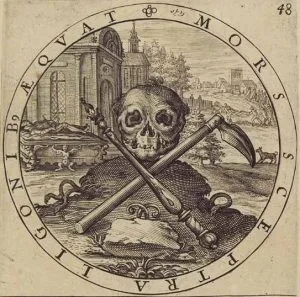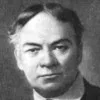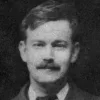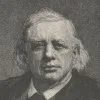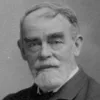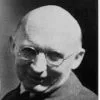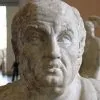[Death equalizes the scepter and the spade.]
(Other Authors and Sources)
Latin proverb
Widely used over the centuries in sermons, religious writings, and inscriptions regarding death and the vanity of worldly rank and honors. Citations I found go back at least to the 16th Century, with use peaking, then tailing off in the 19th Century.
While attributed in various places, without citation, to Lucan, Lucian, or Horace, it does not appear to be actually from any of those writers.
Alternate translations / renderings:Death maketh sceptres and mattocks equal, and as soon arresteth he the prince that carrieth the sceptre, as the poor man that diggeth with the mattock.
[tr. Grindal (1564)]Scepter and crown
Must tumble down,
And in the dust be equal made
With the poor crooked scythe and spade.
[tr. Shirley (1654)]Death mingles scepters with spades.
[tr. Henry (1806)]Death is the head of the leveling party.
[tr. Cawdry (1869)]In death there is no difference betwixt the king and the beggar.
[tr. Cawdry (1869)]In death there is no difference made
Between the sceptre and the spade.
[Inverness tombstone of Samuel Urquhart (1700); see Swift, below]In Death, no Difference is made,
Betweene the Sceptre, and the Spade.
[Inverness tombstone of John Cutherbert of Drakes (1711)]Death makes sceptres and hoes equal.
[tr. Aavitsland (2012)]Death makes scepters equal with hoes.
[tr. Stone (2013)]
Variants:Mors dominos servis et sceptra ligonibus æquat,
Dissimiles simili condicione trahens.
[Death comes alike to monarch, lord, and slave,
And levels all distinctions in the grave.]
[Hall (1909), from Colman (c. 1633)]Ah! who, in our degenerate days,
As nature prompts, his offering pays?
Here nature never difference made
Between the sceptre and the spade.
[Swift (1730), regarding the goddess of the sewer, Cloacina]
Quotations about:
poverty
Note not all quotations have been tagged, so Search may find additional quotes on this topic.
ORESTES: Ye Gods! There’s no art to tell a decent man,
since generations work haphazardly.
I’ve encountered worthless men, the sons
of noble fathers; good men born from bad;
and I’ve seen hunger in a rich man’s mind,
a poor man’s body housing thoughts sublime.[ὈΡΈΣΤΗΣ: φεῦ:
οὐκ ἔστ᾽ ἀκριβὲς οὐδὲν εἰς εὐανδρίαν:
ἔχουσι γὰρ ταραγμὸν αἱ φύσεις βροτῶν.
ἤδη γὰρ εἶδον ἄνδρα γενναίου πατρὸς
τὸ μηδὲν ὄντα, χρηστά τ᾿ ἐκ κακῶν τέκνα,
λιμόν τ᾿ ἐν ἀνδρὸς πλουσίου φρονήματι,
γνώμην δὲ μεγάλην ἐν πένητι σώματι.]Euripides (485?-406? BC) Greek tragic dramatist
Electra [Ἠλέκτρα], l. 367ff (c. 420 BC) [tr. Wilson (2016)]
(Source)
(Source (Greek)). Alternate translations:There is no certain mark of generous souls:
For in the tempers of mankind prevails
A strange confusion. I have seen the son
Of a great father dwindle into nothing.
And virtuous children spring from wicked Sires;
Among the rich a mean contracted spirit
Have I discover'd, and the poor man's breast
Withi most exalted sentiments inspir'd.
[tr. Wodhull (1809)]Ah! there is no sure mark to recognize a man's worth; for human nature hath in it an element of confusion. For I have seen ere now the son of a noble sire prove himself a worthless knave, and virtuous children sprung from evil parents; likewise dearth in a rich man's spirit, and in a poor man's frame a mighty soul.
[tr. Coleridge (1891)]Alas! there is no sure mark of manliness; for the natures of mortals exhibit a confusion. For already have I seen a man who was naught sprung from a noble sire, and good children [sprung] from bad [fathers[,. and hunger in the spirit of a rich man, and a great mind in a poor body.
[tr. Buckley (1892)]Lo, there is no sure test for manhood’s worth:
For mortal natures are confusion-fraught. --
I have seen ere now a noble father’s son
Proved nothing-worth, seen good sons of ill sires,
Starved leanness in a rich man’s very soul,
And in a poor man’s body a great heart.
[tr. Way (1896)]How dark lies honour hid! And what turmoil
In all things human: sons of mighty men
Fallen to naught, and from ill seed again
Good fruit: yea, famine in the rich man's scroll
Writ deep, and in poor flesh a lordly soul.
[tr. Murray (1905)]Ah! There is no exact way to test a man's worth; for human nature has confusion in it. I have seen before now the son of a noble father worth nothing, and good children from evil parents; famine in a rich man's spirit, and a mighty soul in a poor man's body.
[tr. Coleridge (1938 ed.)]It is impossible to judge a man’s virtue with accuracy. There’s always great confusion in the nature of mortals. I, myself, have seen worthless children born of a virtuous man and from evil parents born brilliant children. I have seen a small, poor mind in a wealthy man and in the soul of a poor man, a great one.
[tr. Theodoridis (2006)]Well, nothing is precise
when it comes to how a man is valued --
men’s natures are confusing. Before this,
I’ve seen a man worth nothing, yet he had
a noble father; I’ve known evil parents
with outstanding children, seen famine
in a rich man’s mind and a great spirit
in a poor man’s body.
[tr. Johnston (2009)]I have known a man of a noble father who turns out
To be nothing while powerful men can rise from the low.
I have seen emptiness in a rich man’s thought
And great judgement in a poor person’s frame.
[tr. @sententiq (2020)]
The Senate passed a bill appropriating 15 million for food, but the House of Representatives (up to today) had not approved it. They said no.
They seem to think that’s a bad precedent, to appropriate money for food — it’s too much like the “dole.” They must think it would encourage hunger.
The way things look, hunger doesn’t need much encouragement. It’s just coming around naturally.Will Rogers (1879-1935) American humorist
Column (1931-01-07), “Daily Telegram: Will Rogers Says Hunger Needs No Encouragement”
(Source)
Nothing incites to money-crimes like great poverty or great wealth.
Mark Twain (1835-1910) American writer [pseud. of Samuel Clemens]
Quoted in Merle Johnson, ed., More Maxims of Mark (1927)
(Source)
Not found in a primary source. Johnson's 1927 work is a 15-page pamphlet, generally considered authentic.
Proud purple kings shall kneel before thy throne,
Mix’d with the poor, their pomp, their glory gone:
All vain distinctions levelled by the grave,
Thy righteous sentence shall condemn or save.[Sub tua purpurei venient vestigia reges
deposito luxu turba cum paupere mixti
(omnia mors aequat); tu damnatura nocentes,
tu requiem latura piis.]Claudian (c. AD 370-404) Greco-Latin poet [Claudius Claudianus; Κλαυδιανός]
The Rape of Prosperine [De Raptu Proserpinæ], Book 2, I. 300 (c. AD 396) [tr. Howard (1854)]
(Source)
Pluto reassuring Proserpine that being Queen of the Underworld has its benefits.
Source of the phrase Omnia mors æquat, "Death levels all things" or "Death makes all equal."
(Source (Latin)), Alternate translations:The rich-clad purple kings shall humbly fall
Before thy throne (mixt with the poore) for all
Death equals; thou the guilty and unjust
Shalt judge, with them, the Innocente and Just.
Those shall bewaile their crimes, these shall be blest
By thee, and sent into eternal rest.
[tr. Diggs (1617)]Before thy lofty Throne, the haughty Pride
Of mighty Kings, their Purple laid aside
And Pageantry of State, shall lowly fall,
Mix'd with the poorer Rout, for Death will equal all.
In Judgement thou shalt sit, with Pow'r supreme,
To crown the Pious and the Bad condemn.
[tr. Hughes (1723)]Monarchs shall appear
Before thee, spoil'd of regal ornament,
And undistinguish'd from the vulgar crowd:
Death renders all men equal. Thou shalt judge
The guilty; and thy hand shall give the meed
To virtue.
[tr. Strutt (1814), l. 369ff]To thy feet shall come purple-clothed kings, stripped of their pomp, and mingling with the unmoneyed throng; for death renders all equal. Thou shalt give doom to the guilty and rest to the virtuous.
[tr. Platnauer (Loeb) (1922)]
In a land of great wealth, families must not live in hopeless poverty. In a land rich in harvest, children just must not go hungry. In a land of healing miracles, neighbors must not suffer and die untended. In a great land of learning and scholars, young people must be taught to read and write.
Lyndon B. Johnson (1908-1973) American politician, educator, US President (1963-69)
Speech (1965-01-20), Inaugural Address, Washington, D. C.
(Source)
The war on poverty is not a struggle simply to support people, to make them dependent on the generosity of others. It is a struggle to give people a chance. It is an effort to allow them to develop and use their capacities, as we have been allowed to develop and use ours, so that they can share, as others share, in the promise of this nation. We do this, first of all, because it is right that we should.
Lyndon B. Johnson (1908-1973) American politician, educator, US President (1963-69)
Letter (1964-03-16), “Special Message to the Congress Proposing a Nationwide War on the Sources of Poverty”
(Source)
The observances of the Church concerning feasts and fasts are tolerably well kept upon the whole, since the rich keep the feasts and the poor the fasts.
Sydney Smith (1771-1845) English clergyman, essayist, wit
(Attributed)
(Source)
In Hesketh Pearson, The Smith of Smiths, ch. 10 (1934).
Poverty must not be a bar to learning, and learning must offer an escape from poverty.
Lyndon B. Johnson (1908-1973) American politician, educator, US President (1963-69)
Speech (1964-05-22), Graduation, University of Michigan, Ann Arbor
(Source)
He is not poore that hath little, but he that desireth much.
George Herbert (1593-1633) Welsh priest, orator, poet.
Jacula Prudentum, or Outlandish Proverbs, Sentences, &c. (compiler), # 309 (1640 ed.)
(Source)
Poverty wants some things, Luxury many things, Avarice all things.
Benjamin Franklin (1706-1790) American statesman, scientist, philosopher, aphorist
Poor Richard (1735 ed.)
(Source)
Thirst, hunger, and nakedness, are positive evils: but wealth is relative; and a prince who would be rich in a private station, may be exposed by the increase of his wants to all the anxiety and bitterness of poverty.
Edward Gibbon (1737-1794) English historian
The History of the Decline and Fall of the Roman Empire, ch. 61 (1776-88)
(Source)
We sleek, well-fed folk can hardly realize what feeling hungry is like. We know what it is to have no appetite and not to care for the dainty victuals placed before us, but we do not understand what it means to sicken for food — to die for bread while others waste it — to gaze with famished eyes upon coarse fare steaming behind dingy windows, longing for a pen’orth of pea pudding and not having the penny to buy it — to feel that a crust would be delicious and that a bone would be a banquet.
Jerome K. Jerome (1859-1927) English writer, humorist [Jerome Klapka Jerome]
Idle Thoughts of an Idle Fellow, “On Eating and Drinking” (1886)
(Source)
If he is poor who is full of Desires, nothing can equal the Poverty of the Ambitious and the Covetous.
[S’il est vrai que l’on soit pauvre par toutes les choses que l’on désire, l’ambitieux et l’avare languissent dans une extrême pauvreté.]Jean de La Bruyère (1645-1696) French essayist, moralist
The Characters [Les Caractères], ch. 6 “Of Gifts of Fortune [Des Biens de Fortune],” § 49 (6.49) (1688) [Browne ed. (1752)]
(Source)
(Source (French)). Alternate translations:If he is only poor who desires much, and is always in want; the Ambitious and the Covetous languish in extreme Poverty.
[Bullord ed. (1696)]If a Man is poor, by all the things which he longs for, the Ambitious and Covetous languish in extreme Poverty.
[Curll ed. (1713)]If a man be poor who wishes to have everything, then an ambitious and a miserly man languish in extreme poverty.
[tr. Van Laun (1885)]If it is true that poverty consists in desiring a great many things, the ambitious man and the miser suffer from extreme poverty.
[tr. Stewart (1970)]
It is always easy as well as agreeable for the inferior ranks of mankind to claim merit from the contempt of that pomp and pleasure which fortune has placed beyond their reach. The virtue of the primitive Christians, like that of the first Romans, was very frequently guarded by poverty and ignorance.
Edward Gibbon (1737-1794) English historian
The Decline And Fall of the Roman Empire, Vol. 2, ch. 15 (1781)
(Source)
See La Rochefoucauld.
A man is rich whose income is larger than his expenses, and he is poor if his expenses are greater than his income.
[Celui-là est riche, qui reçoit plus qu’il ne consume; celui-là est pauvre, dont la dépense excède la recette.]Nicolas Chamfort (1741-1794) French writer, epigrammist (b. Nicolas-Sébastien Roch)
The Characters [Les Caractères], ch. 6 “Of Gifts of Fortune [Des Biens de Fortune],” § 49 (6.49) (1688) [tr. Van Laun (1885)]
(Source)
(Source (French)). Alternate translations:He is rich whose Receipt is more than his Expences, and he is poor whose Expences are more than his Receipt.
[Bullord ed. (1696)]He is rich, whose Income is more than his Expences; and he is poor whose Expences are more than his Income.
[Curll ed. (1713)]He is rich, whose Income is more than his Expences; and he is poor whose Expences exceed his Income.
[Browne ed. (1752)]That man is rich, who gets more than he spends; that man is poor, whose expenses exceed his receipts.
[tr. Stewart (1970)]
“But whom do I treat unjustly,” you say, “by keeping what is my own?” Tell me, what is your own? What did you bring into this life? From where did you receive it? It is as if someone were to take the first seat in the theater, then bar everyone else from attending, so that one person alone enjoys what is offered for the benefit of all in common — this is what the rich do. They seize common goods before others have the opportunity, then claim them as their own by right of preemption. For if we all took only what was necessary to satisfy our own needs, giving the rest to those who lack, no one would be rich, no one would be poor, and no one would be in need.
[Καὶ ποῖον, λέγει, ἀδικῶ, μὲ τὸ νὰ κρατῶ γιὰ τoν ἐαυτόν μου αὐτὰ ποῦ μου ἀνήκουν; Ποία, εἰπέ μου, εἶναι αὐτὰ ποῦ σου ἀνήκουν; Ἀπὸ ποῦ τὰ ἔλαβες, καὶ τὰ ἔφερες στὴν ζωὴν αὐτήν; Ὅπως ἀκριβῶς κάποιος ποὺ εὑρίσκει στὸ θέατρο θέση μὲ καλὴν θέαν, ἐμποδίζει ἔπειτα τοὺς εἰσερχομένους, θεωρώντας ὡς ἰδικὸ τοῦ αὐτὸ ποὺ προορίζεται γιὰ χρῆσιν κοινήν, ἔτσι εἶναι καὶ οἱ πλούσιοι. Ἀφοῦ ἐκυρίευσαν ἐκ τῶν προτέρων τα κοινὰ ἀγαθά, τὰ ἰδιοποιοῦνται ἁπλῶς ἐπειδὴ τὰ ἐπρόλαβαν. Ἐὰν ὁ καθένας ἐκρατοῦσε ἐκεῖνο ποὺ ἀρκεῖ γιὰ τὴν ἱκανοποίηση τῶν ἀναγκῶν του, καὶ ἄφηνε τὸ περίσσευμα σ’ αὐτὸν ποὺ τὸ χρειάζεται, κανεὶς δὲν θὰ ἦταν πλούσιος, ἀλλὰ καὶ κανεὶς πτωχός.]
Basil of Caesarea (AD 330-378) Christian bishop, theologian, monasticist, Doctor of the Church [Saint Basil the Great, Ἅγιος Βασίλειος ὁ Μέγας]
“I Will Tear Down My Barns [καθελῶ μου τὰς ἀποθήκας],” Sermon # 6 [tr. Schroeder (2009)]
(Source)
In C. Paul Schroeder, ed., Saint Basil on Social Justice (2009).
In truth, poverty is an anomaly to rich people. It is very difficult to make out why people who want dinner do not ring the bell.
Walter Bagehot (1826-1877) British businessman, essayist, journalist
“The Waverley Novels,” National Review (1858-04)
(Source)
A review of Sir Walter Scott's very popular and lengthy book series of that name, which includes his (today) most famous, Ivanhoe.
In truth, it is not want, but rather abundance, that breeds avarice.
[De vray, ce n’est pas la disette, c’est plustost l’abondance qui produict l’avarice.]
Michel de Montaigne (1533-1592) French essayist
Essays, Book 1, ch. 14 “The Taste of Good and Bad Things Depends Mostly on the Opinion We Have of Them [Que le goust des biens et des maux despend en bonne partie de l’opinion que nous en avons]” (1572) (1.14) (1595) [tr. Frame (1943)]
(Source)
Though this chapter was written around 1572 for the 1580 edition, this text was added for the 1588 edition. The chapter as a whole was numbered ch. 14 in the 1580 and 1588 editions, moved to ch. 40 for the 1595 ed. Most modern translations use the original numbering.
(Source (French)). Alternate translations:Verily, it is not want, but rather plenty that causeth avarice.
[tr. Florio (1603), ch. 40]In plain truth, it is not Want, but rather Abundance, that Creates Avarice.
[tr. Cotton (1686), ch. 40]In truth, it is not want, but rather abundance, that creates avarice.
[tr. Cotton/Hazlitt (1877), ch. 40]In truth, it is not want, but rather abundance, which gives birth to avarice.
[tr. Ives (1925)]And truly it is not want that produces avarice but plenty.
[tr. Screech (1987)]Truly, abundance rather than want causes stinginess.
[tr. HyperEssays (2023)]
There are such things as to speak well, to speak easily, to speak correctly, and to speak seasonably. We offend against the last way of speaking if we mention a sumptuous entertainment we have just been present at before people who have not had enough to eat; if we boast of our good health before invalids; if we talk of our riches, our income, and our fine furniture to a man who has not so much as an income or a dwelling; in a word, if we speak of our prosperity before people who are wretched; such a conversation is too much for them, and the comparison which they then make between their condition and ours is very painful.
[Il y a parler bien, parler aisément, parler juste, parler à propos. C’est pécher contre ce dernier genre que de s’étendre sur un repas magnifique que l’on vient de faire, devant des gens qui sont réduits à épargner leur pain; de dire merveilles de sa santé devant des infirmes; d’entretenir de ses richesses, de ses revenus et de ses ameublements un homme qui n’a ni rentes ni domicile; en un mot, de parler de son bonheur devant des misérables: cette conversation est trop forte pour eux, et la comparaison qu’ils font alors de leur état au vôtre est odieuse.]
Jean de La Bruyère (1645-1696) French essayist, moralist
The Characters [Les Caractères], ch. 5 “Of Society and Conversation [De la Société et de la Conversation],” § 23 (5.23) (1688) [tr. Van Laun (1885)]
(Source)
(Source (French)). Alternate translations:Some men talk well, easily, justly, and to the purpose: those offend in the last kind, who speak of the Banquets they are to be at, before such as are reduc'd to spare their Bread; of sound Limbs, before the Infirm; of Demesnes and Revenues, before the Poor and Needy; of fine Houses and Furniture, before such as have neither Dwelling or Moveables: in a word, who speak of Prosperity, before the Miserable. This conversation is too strong for 'em, and the comparison you make between their condition and yours is odious.
[Bullord ed. (1696)]There is speaking well, speaking easily, speaking justly, and speaking seasonably: 'Tis transgressing the last rule, to speak ofthe sumptuous Entertainments you have made, before such as are reduc'd to want of Bread; of a healthy Constitution of Body, before the Infirm; of Demesnes, Revenues and Furniture, before a Man who has neither Dwelling, Rents, nor Movables; in a word, to speak of your Prosperity before the Miserable: this Conversation is too strong from them, and the Comparison they make between their Condition and yours is odious.
[Curll ed. (1713)]There is speaking well, speaking easily, speaking justly, and speaking seasonably: It is offending against the last, to speak of Entertainments before the Indigent; of sound Limbs and Health before the Infirm; of Houses and Lands before one who has not so much as a Dwelling; in a Word, to speak of your Prosperity before the Miserable; this Conversation is cruel, and the Comparison which naturally rises in them betwixt their Condition and yours is excruciating.
[Browne ed. (1752)]There is a difference between speaking well, speaking easily, speaking with judgement and speaking opportunely. We fail in this last respect when we enlarge upon the splendid meal we have just enjoyed in front of people who have to be thrifty of their bread; or boast of our health in the presence of invalids; or talk about our wealth, our fortune and property to a man who has neither home nor income; in a word, when we speak of our happiness in front of those who are wretched; such conversation is too painful for them, and the comparison they are bound to make between your state and their own is intolerable.
[tr. Stewart (1970)]
My first job after college was as a teacher in Cotulla, Texas, in a small Mexican-American school. Few of them could speak English, and I couldn’t speak much Spanish. My students were poor and they often came to class without breakfast, hungry. They knew even in their youth the pain of prejudice. They never seemed to know why people disliked them. But they knew it was so, because I saw it in their eyes. I often walked home late in the afternoon, after the classes were finished, wishing there was more that I could do. But all I knew was to teach them the little that I knew, hoping that it might help them against the hardships that lay ahead.
Somehow you never forget what poverty and hatred can do when you see its scars on the hopeful face of a young child.Lyndon B. Johnson (1908-1973) American politician, educator, US President (1963-69)
Speech (1965-03-15), “The American Promise,” Joint Session of Congress [40:55]
(Source)
Nature never said to me: Do not be poor; still less did she say: Be rich; her cry to me was always: Be independent.
[La Nature ne m’a point dit: ne sois point pauvre; encore moins: sois riche; mais elle me crie: sois indépendant.]
Nicolas Chamfort (1741-1794) French writer, epigrammist (b. Nicolas-Sébastien Roch)
Products of Perfected Civilization [Produits de la Civilisation Perfectionée], Part 1 “Maxims and Thoughts [Maximes et Pensées],” ch. 4, ¶ 281 (1795) [tr. Mathers (1926)]
(Source)
(Source (French)). Alternate translations:Nature has not said to me: Be not poor; still less: Be rich. But she cries out to me: Be independent.
[tr. Hutchinson (1902)]Nature did not say to me, “Do not be poor”; still less, “Be rich”; but she cried out to me, “Be independent.”
[tr. Merwin (1969)]Nature did not tell me, "Do not be poor"; still less did it say "Be rich"; but it does cry to me: "Be independent."
[tr. Pearson (1973)]Nature never urged me, "Be not poor," much less, "Be rich." Instead, she shouts: "Be independent."
[tr. Dusinberre (1992)]Nature didn't tell me, "Don't be poor!"; and certainly didn't say: "Get rich!"; but she did shout: "Always be independent!"
[tr. Parmée (2003), ¶174]Nature didn't say to me "Never be poor."; still less "Be rich."; but it cried "Be independant."
[tr. Sinicalchi]
More ease than masters, servants lives afford:
Think on that, Tom; nor wish to be your lord.
On a coarse rug you most securely snore:
Deep sunk in down he counts each sleepless hour.
Anxious betimes to every statesman low
He bows; much lower than to him you bow.
Behold him with a dun at either ear,
“Pray, pay,” the word; a word you never hear.
Fear you a cudgel? view his gouty state;
Which he would change for many a broken pate.
You know no morning qualm; no costly whore:
Think then, though not a lord, that you are more.[Quae mala sint domini, quae servi commoda, nescis,
Condyle, qui servum te gemis esse diu.
Dat tibi securos vilis tegeticula somnos,
Pervigil in pluma Gaius, ecce, iacet.
Gaius a prima tremebundus luce salutat
Tot dominos, at tu, Condyle, nec dominum.
‘Quod debes, Gai, redde’ inquit Phoebus et illinc
Cinnamus: hoc dicit, Condyle, nemo tibi.
Tortorem metuis? podagra cheragraque secatur
Gaius et mallet verbera mille pati.
Quod nec mane vomis nec cunnum, Condyle, lingis,
Non mavis, quam ter Gaius esse tuus?]Martial (AD c.39-c.103) Spanish Roman poet, satirist, epigrammatist [Marcus Valerius Martialis]
Epigrams [Epigrammata], Book 9, epigram 92 (9.92) (AD 94) [tr. Hay (1755)]
(Source)
Masters often think themselves more put-upon than their lazy, "carefree" servants/slaves, as do the rich versus the poor. "To Condylus" (Source (Latin)). Alternate translations:The weal of a servant, and woe of his lord,
Thou know'st not, who so long hast service abhorr'd.
Securest of slumbers thy coverlet crown:
Thy master, my Condyl, lies watching in down.
Lords many hails he, the chill morn just begun:
Thou own'st no such duty, saluting scarce one.
To him this and that wight: Pray, pay what you ow.
To thee not a mortal pretends to say so.
Thou feat'st but a flogging: he's rackt with the gout.
A thousand sound lashes he'd rather stand out.
Nor sick thou at morning, nor pale with disease:
Who's moire, prithee, thou or thy master at ease?
[tr. Elphinston (1782), Book 4, Part 2, ep. 35]Of the troubles of a master, and the pleasures of a slave, Condylus, you are ignorant, when you lament that you have been a slave so long. A common rug gives you sleep free from all anxiety; Caius lies awake all night on his bed of down. Caius, from the first dawn of day, salutes with trembling a number of patrons; you, Condylus, salute not even your master. "Caius, pay what you owe me," cries Phoebus on the one side, and Cinnamus on the other; no one makes such a demand on you, Condylus. Do you fear the torturer? Caius is a martyr to the gout in his hands and feet, and would rather suffer a thousand floggings than endure its pains. You indulge neither gluttonous nor licentious propensities. Is not this preferable to being three times a Caius?
[tr. Bohn's Classical (1859)]The lowliest cot will give thee powerful sleep,
While Caius tosses on his bed of down.
[ed. Harbottle (1897), 9.93.3]What are a master's ills, what a slave's blessings you do not know, Condylus, who groan that you are so long a slave. Your common rush-mat affords you sleep untoubled; wakeful all night on down, see, Gaius lies! Gaius from early morn salutes trembling many masters; but you, Condylus, not even your master. "What you owe, Gaius, pay," says Phoebus, and after him Cinnamus: this no one Condylus says to you. Do you dread the torturer? By gout in food and hand Gaius is stabbed, and would choose instead to endure a thousand blows. You do not vomit in the morning, nor are you given to filthy vice, Condylus: do you not prefer this to being your Gaius three times over?
[tr. Ker (1919)]"How easy live the free," you say, and brood
Upon your long but easy servitude.
See Gaius tossing on his downy bed;
Your sleep’s unbroken tho’ the couch be rude;
He pays his call ere chilly dawn be red,
You need not call on him, you sleep instead;
He’s deep in debt, hears many a summons grim
From creditors that you need never dread,
You might be tortured at your master’s whim;
Far worse the gout that racks his every limb;
Think of the morning qualms, his vicious moods.
Would you for thrice his freedom change with him?
[tr. Pott & Wright (1921), "True Servitude"]Condylus, you lament that you have been so long a slave; you don't know a master's afflictions and a slave's advantages. A cheap little mat gives you carefree slumbers: there's Gaius lying awake all night on feathers. From daybreak on Gaius in fear and trembling salutes so many masters: but you, Condylus, do not salute even your own. "Gaius, pay me back what you owe," says Phoebus, and from yonder so says Cinnamus: nobody says that to you, Condylus. You fear the torturer? Gaius is cut by gout in foot and hand and would rather take a thousand lashes. You don't vomit of a morning or lick a cunt, Condylus; isn't that better than being your Gaius three times over?
[tr. Shackleton Bailey (1993)]Never the pros & cons of "slave," or "master,"
can you, mourning long servitude, discern.
The cheapest matting yields you dreamless sleep;
Gaius's feather-bed keeps him awake.
From crack of down Gaius respectfully
greets many masters; yours goes ungreeted.
"Pay day, Gaius, pay!" says Phoebus. "Pay! Pay!"
chimes Cinnamus. What man speaks thus to you?
Screw & rack, you dread? Gaius' gout stabs so
he'ld far prefer the thumbscrew or the rack.
You've no hangover habit, oral sex:
is not one life of yours worth three of his?
[tr. Whigham (2001)]
Art followed hard on art. Toil triumphed over every obstacle, unrelenting Toil, and Want that pinches when life is hard.
[Tum variae venere artes. Labor omnia vicit
inprobus et duris urgens in rebus egestas.]Virgil (70-19 BC) Roman poet [b. Publius Vergilius Maro; also Vergil]
Georgics [Georgica], Book 1, l. 145ff (1.145) (29 BC) [tr. Fairclough (Loeb) (1916)]
(Source)
On humanity developing the arts and sciences in response to Jove making life difficult.
Compare this to Labor omnia vincit ("Work conquers all"), Oklahoma's state motto.
(Source (Latin)). Alternate translations:Then came strange arts, fierce labor all subdues.
Inforc'd by bold Necessity, and Want.
[tr. Ogilby (1649)]And various Arts in order did succeed,
(What cannot endless Labour urg'd by need?)
[tr. Dryden (1709), ll. 217-218]Thus by long labour arts to arts succeed,
Such is the force of all-compelling need.
[tr. Nevile (1767)]Thus rous'd by varied wants new arts arose,
And strenuous Labour triumph'd at its close.
[tr. Sotheby (1800)]Then various arts ensued. Incessant labour and want, in hardships pressing, surmounted every obstacle.
[tr. Davidson (1854)]Then came the various arts: oh, grand success
Of reckless toil and resolute distress!
[tr. Blackmore (1871)]Then came the various arts of life. So toil, relentless toil, and the pressure of want in adversity, conquered the world. [tr. Wilkins (1873)]Then divers arts arose; toil conquered all,
Remorseless toil, and poverty's shrewd push
In times of hardship.
[tr. Rhoades (1881)]Thus stern Necessity inventive tried
Fresh arts, which life’s increasing wants supplied.
[tr. King (1882)]Then various arts followed. Unwearying labor overcame every difficulty, and want spurring men on in times of hardship.
[tr. Bryce (1897)]Then arts many in sort; nothing but yielded to unrelenting toil and the hard pressure of poverty.
[tr. Mackail (1899)]Then divers arts arose; toil conquered all,
Remorseless toil, and poverty's shrewd push
In times of hardship.
[tr. Greenough (1900)]Then followed manifold arts: unflinching toil ever one
Triumphs: in hardship's school stern need still drave men on.
[tr. Way (1912)]Then later times
Brought forth of other arts the varied skill.
Work conquered all, relentless, obstinate,
While poverty and hardship urged it on.
[tr. Williams (1915)]Then numerous arts arose. Yes, unremitting labour
And harsh necessity's hand will master anything.
[tr. Day-Lewis (1940)]Then followed all the civilizing arts:
Hard labor conquered all, and pinching need.
[tr. Bovie (1956)]Then all kinds of skills came into being. Toil has overcome all things, runious toil and need, pressing in harsh circumstances.
[tr. Miles (1980)]And last the various arts.
Toil mastered everything, relentless toil
And the pressure of pinching poverty.
[tr. Wilkinson (1982)]Then came the various arts. Hard labour conquered all,
and poverty’s oppression in harsh times.
[tr. Kline (2001)] https://www.poetryintranslation.com/PITBR/Latin/VirgilGeorgicsI.php#anchor_Toc533589845:~:text=then%20came%20the,in%20harsh%20times.Then came the arts in many guises. Relentless work conquered
all difficulties -- work and urgent need when times were hard.
[tr. Lembke (2004)]All this before the knowledge and know-how which ensued. Hard work prevailed, hard work and pressing poverty.
[tr. Fallon (2006)]And then myriad arts. Toil subdued the earth, relentless toil, and the prick of dearth in hardship.
[tr. Johnson (2009)]Then followed other arts; and everything
Was toil, relentless toil, urged on by need.
[tr. Ferry (2015)]
You can be young without money but you can’t be old without it. You’ve got to be old with money because to be old without it is just too awful, you’ve got to be one or the other, either young or with money, you can’t be old and without it.
Tennessee Williams (1911-1983) American playwright
Cat on a Hot Tin Roof, Act 1 [Margaret] (1955)
(Source)
All Doctors should make enough out of those who are well able to pay, to be able to do all work for the poor free. That is one thing that a poor person should never be even expected to pay for is medical attention, and not from an organized Charity, but from our best Doctors. But your Doctor bill should be paid like your Income tax, according to what you have. There’s nothing that keeps poor people poor as much as paying Doctor bills.
Money poisons you when you’ve got it, and starves you when you haven’t.
David Herbert "D. H." Lawrence (1885-1930) English novelist
Lady Chatterley’s Lover, ch. 19 [Mellors] (1928)
(Source)
You don’t seem to realize that a poor person who is unhappy is in a better position than a rich person who is unhappy. Because the poor person has hope. He thinks money would help. I tell you there is no despair like the despair of the man who has everything.
Jean Kerr (1922-2003) American author and playwright [b. Bridget Jean Collins]
Poor Richard, Act 1 [Sydney] (1963)
(Source)
Money is a singular thing. It ranks with love as man’s greatest source of joy. And with death as his greatest source of anxiety.
John Kenneth Galbraith (1908-2006) Canadian-American economist, diplomat, author
The Age of Anxiety, ch. 6 “The Rise and Fall of Money” (1977)
(Source)
People feel shameful to be poor and underprivileged in a well-run country. You should feel shameful if you are rich and aristocratic in a decadent and corrupt country.
[邦有道、貧且賤焉、恥也、邦無道、富且貴焉、恥也。]
Confucius (c. 551- c. 479 BC) Chinese philosopher, sage, politician [孔夫子 (Kǒng Fūzǐ, K'ung Fu-tzu, K'ung Fu Tse), 孔子 (Kǒngzǐ, Chungni), 孔丘 (Kǒng Qiū, K'ung Ch'iu)]
The Analects [論語, 论语, Lúnyǔ], Book 8, verse 13, sec. 3 (8.13.3) (6th C. BC – AD 3rd C.) [tr. Li (2020)]
(Source)
Brooks (below) says that this analect was added into Book 8 at the time of Book 14 being produced.
(Source (Chinese)). Alternate translations:When a country is well-governed, poverty and a mean condition are things to be ashamed of. When a country is ill-governed, riches and honour are things to be ashamed of.
[tr. Legge (1861)]Under a good government it will be a disgrace to him if he remain in poverty and low estate; under a bad one it would be equally disgraceful to him to hold riches and honours.
[tr. Jennings (1895)]When there is justice and order in the government of his own country, he should be ashamed to be poor and without honour; but when there is no justice in the government of his own country he should be ashamed to be rich and honoured.
[tr. Ku Hung-Ming (1898)]When law and order prevail in his State, he is ashamed to be needy and of no account. When law and order fail, he is ashamed to be in affluence and honour.
[tr. Soothill (1910)]When a state is functioning, poverty and meanness are shameful; when a state is in chaos (ill governed) riches and honours are shameful. [Let us say: under a corrupt government.]
[tr. Pound (1933)]When the Way prevails in your own land, count it a disgrace to be needy and obscure; when the Way does not prevail in your land, then count it a disgrace to be rich and honoured.
[tr. Waley (1938)]If a state is following The Right Way, it is a disgrace to be in poverty and a low estate therein; if not, it is a disgrace to be rich and honored therein.
[tr. Ware (1950)]It is a shameful matter to be poor and humble when the Way prevails in the state. Equally, it is a shameful matter to be rich and noble when the Way falls into disuse in the state.
[tr. Lau (1979)]When the Way prevails in your own state, to be made poor and obscure by it is a disgrace; but when teh Way does not prevail in your own state, to be made rich and honourable by it is a disgrace.
[tr. Dawson (1993)]In a country where the Way prevails, it is shameful to remain poor and obscure; in a country which has lost the Way, it is shameful to become rich and honored.
[tr. Leys (1997)]When the state possesses the Way and you are poor and lowly, it is a shame; when the state loses the Way and you are rich and noble, it is also a shame.
[tr. Huang (1997)]If the country is on the right way, it is the shame to be poor and low; If the country is not on the right way, it is the shame to be rich and honor.
[tr. Cai/Yu (1998), #201]It is a disgrace to remain poor and without rank when the way prevails in the state; it is a disgrace to be wealthy and of noble rank when it does not.
[tr. Ames/Rosemont (1998)]When the state has the Way, to be poor and humble in it is shameful; when the state has not the Way, to be wealthy and honored in it is shameful.
[tr. Brooks/Brooks (1998)]When the Way rules in your country, there's shame in poverty and obscurity; when the Way's lost in your country, there's shame in wealth and renown.
[tr. Hinton (1998)]In a state that has the Way, to be poor and of low status is a cause for shame; in a state that is without the Way, to be wealthy and honored is equally a cause for shame.
[tr. Slingerland (2003)]When the state follows the Way, being poor and lowly is a cause for shame. When the state is without the Way, being rich and eminent is a cause for shame.
[tr. Watson (2007)]When the moral way prevails in a state, being poor and lowly is a cause for shame. When the moral way does not prevail in the world, having wealth and position is a cause for shame.
[tr. Chin (2014)]
Again we have deluded ourselves into believing the myth that Capitalism grew and prospered out of the Protestant ethic of hard work and sacrifice. The fact is that Capitalism was built on the exploitation and suffering of black slaves, and continues to thrive on the exploitation of the poor, both black and white, both here and abroad.
Martin Luther King, Jr. (1929-1968) American clergyman, civil rights leader, social activist, preacher
“The Three Evils,” Keynote Speech, National Conference for New Politics, Chicago (31 Aug 1967)
(Source)
The great question for our time is, how to make sure that the continuing scientific revolution brings benefits to everybody rather than widening the gap between rich and poor. To lift up poor countries, and poor people in rich countries, from poverty, to give them a chance of a decent life, technology is not enough. Technology must be guided and driven by ethics if it is to do more than provide new toys for the rich.
Freeman Dyson (1923-2020) English-American theoretical physicist, mathematician, futurist
“Progress in Religion,” Templeton Prize acceptance speech, Washington National Cathedral (9 May 2000)
(Source)
A poor man defended himself when charged with stealing food to appease the cravings of hunger, saying, the cries of the stomach silenced those of the conscience.
Marguerite Gardiner, Countess of Blessington (1789-1849) Irish novelist [Lady Blessington, b. Margaret Power]
(Attributed)
(Source)
Quoted, without citation, in R. R. Madden, The Literary Life and Correspondence of the Countess of Blessington, Vol. 1 (1855).
‘Tis unbecoming not to shed a tear
Over the wretched; he too is devoid
Of virtue, who abounds in wealth, yet scruples
Thro’ sordid avarice to relieve their wants.Euripides (485?-406? BC) Greek tragic dramatist
Antiope [Αντιοπη], frag. (c. 410 BC) [tr. Wodhall (1809)]
(Source)
Barnes frag. 62, Musgrave frag. 40.
What is at issue here is relative poverty, not absolute poverty. Inferiority is a relative concept. When everyone is poor together, there is no shame in being poor. As Marx said, it is not living in a hovel that causes people to feel ashamed, it is living in a hovel next to a palace. And as he also said, shame is the emotion of revolution, i.e. of violence. But one does not have to be a Marxist, or subscribe to everything he said (and I do not), in order to see how correct his insight was.
James Gilligan (b. c. 1936) American psychiatrist and author
Preventing Violence, ch. 5 (2001)
(Source)
It’s simply a national acknowledgement that in any kind of priority, the needs of human beings must come first. Poverty is here and now. Hunger is here and now. Racial tension is here and now. Pollution is here and now. These are the things that scream for a response. And if we don’t listen to that scream — and if we don’t respond to it — we may well wind up sitting amidst our own rubble, looking for the truck that hit us — or the bomb that pulverized us. Get the license number of whatever it was that destroyed the dream. And I think we will find that the vehicle was registered in our own name.
Rod Serling (1924-1975) American screenwriter, playwright, television producer, narrator
Commencement Address, University of Southern California (17 Mar 1970)
(Source)
In Anne Serling, As I Knew Him: My Dad, Rod Serling, ch. 28 (2013).
There can be no equal justice where the kind of trial a man gets depends on the amount of money he has.
Hugo Black (1886-1971) American politician and jurist, US Supreme Court Justice (1937-71)
Griffin v. Illinois, 351 US 12, 19 (1956) [majority opinion]
(Source)
On the Constitutional requirement for states to ensure not only that trial defense is available to poor defendants, but that appeals costs be addressed as well.
“Some people say we shouldn’t give alms to the poor, Shirley.”
“They are great fools for their pains. For those who are not hungry, it is easy to palaver about the degradation of charity, and so on; but they forget the brevity of life, as well as its bitterness. We have none of us long to live: let us help each other through seasons of want and woe, as well as we can, without heeding in the least the scruples of vain philosophy.”
Charlotte Brontë (1816-1855) British novelist [pseud. Currer Bell]
Shirley, ch. 14 [Lina and Shirley] (1849)
(Source)
A society which reverences the attainment of riches as the supreme felicity will naturally be disposed to regard the poor as damned in the next world, if only to justify making their life a hell in this.
R. H. Tawney (1880-1962) English writer, economist, historian, social critic [Richard Henry Tawney]
Religion and the Rise of Capitalism, ch. 4: The Puritan Movement, sec. 4 “The New Medicine for Poverty” (1926)
(Source)
Originally delivered as Holland Lectures, Kings College (Feb-Mar 1922).
For my part, I prefer a man without money to money without a man.
[Ego vero, malo virum, qui pecunia egeat, quam pecuniam, quae viro.]
Themistocles (c. 524-459 BC) Athenian politician and general
Quoted in Cicero, De Officiis [On Duties; On Moral Duty; The Offices], Book 2, ch. 20 / sec. 71 (44 BC) [tr. Miller (1913)]
(Source)
Original Latin (of Cicero). When asked whether he would choose for his daughter a poor but honest husband or a wealthy but disreputable one.
Alternate translations:The comment is also recorded in Plutarch, Parallel Lives, "Themistocles," ch. 18, sec. 5 [tr. Dryden (1653), rev. Clough (1859)]:
- "I had rather have a man without an estate, than to have an estate without a man." [tr. Cockman (1699)]
- "I would rather have a man without money, than money without a man." [tr. McCartney (1798)]
- "I certainly would rather she married a man without money, than money without a man." [tr. Edmonds (1865)]
- "I, indeed, prefer the man who lacks money to the money that lacks a man." [tr. Peabody (1883)]
Of two who made love to his daughter, he preferred the man of worth to the one who was rich, saying he desired a man without riches, rather than riches without a man.
Original Greek: τῶν δὲ μνωμένων αὐτοῦ τὴν θυγατέρα τὸν ἐπιεικῆ τοῦ πλουσίου προκρίνας ἔφη ζητεῖν ἄνδρα χρημάτων δεόμενον μᾶλλον ἢ χρήματα ἀνδρός.
Alternate translations:
- "When two men paid their addresses to his daughter, he chose the more agreeable instead of the richer of the two, saying that he preferred a man without money to money without a man." [tr. Stewart/Long (1894)]
- "Of two suitors for his daughter's hand, he chose the likely man in preference to the rich man, saying that he wanted a man without money rather than money without a man." [tr. Perrin (1914)]
If all men were rich, all men would be poor.
Mark Twain (1835-1910) American writer [pseud. of Samuel Clemens]
Mark Twain’s Noteook (1935 ed) [ed. Paine]
(Source)
Where some possess much, and the others nothing, there may arise an extreme democracy, or a pure oligarchy; or a tyranny may grow out of either extreme.
Aristotle (384-322 BC) Greek philosopher
Politics [Πολιτικά], Book 4, ch. 11 / 1296a.1-3 [tr. Jowett (1885)]
(Source)
Alternate translations:
- "When some possess too much, and others nothing at all, the government must either be in the hands of the meanest rabble or else a pure oligarchy; or, from the excesses of both, a tyranny." [tr. Ellis (1912)]
- "Where some own a very great deal of property and others none there comes about either an extreme democracy or an unmixed oligarchy, or a tyranny may result from both of the two extremes." [tr. Rackham (1932)]
- "Where some possess very many things and others nothing, either rule of the people in its extreme form must come into being, or unmixed oligarchy, or -- as a result of both of these excesses -- tyranny." [tr. Reeve (2007)]
- "Where some people are very wealthy and others have nothing, the result will be either extreme democracy or absolute oligarchy, or despotism will come from either of those excesses."
It is also advantageous for a tyranny that all those who are under it should be oppressed with poverty, that they may not be able to compose a guard; and that, being employed in procuring their daily bread, they may have no leisure to conspire against their tyrants.
[καὶ τὸ πένητας ποιεῖν τοὺς ἀρχομένους τυραννικόν, ὅπως μήτε φυλακὴ τρέφηται καὶ πρὸς τῷ καθ᾽ ἡμέραν ὄντες ἄσχολοι ὦσιν ἐπιβουλεύειν.]
Aristotle (384-322 BC) Greek philosopher
Politics [Πολιτικά], Book 5, ch. 11 / 1313b.16 [tr. Ellis (1912)]
(Source)
Original Greek. Alternate translations:
- "Also he should impoverish his subjects; he thus provides against the maintenance of a guard by the citizen and the people, having to keep hard at work, are prevented from conspiring." [tr. Jowett (1885)]
- "And it is a device of tyranny to make the subjects poor, so that a guard may not be kept, and also that the people being busy with their daily affairs may not have leisure to plot against their ruler." [tr. Rackham (1932)]
- "It is also a feature of tyranny to make the ruled poor, so that they cannot sustain their own defense, and are so occupied with their daily needs that they lack the leisure to conspire." [tr. Lord (1984)]
- "It is also in the interests of a tyrant to make his subjects poor, so that he may be able to afford the cost of his bodyguard, while the people are so occupied with their daily tasks that they have no time for plotting."
The evangelist was preaching “sin and redemption,” the infinite grace of God and His pardon for human frailty. He was very much in earnest, and he meant well, but Jurgis, as he listened, found his soul filled with hatred. What did he know about sin and suffering — with his smooth, black coat and his neatly starched collar, his body warm, and his belly full, and money in his pocket — and lecturing men who were struggling for their lives, men at the death grapple with the demon powers of hunger and cold! — This, of course, was unfair; but Jurgis felt that these men were out of touch with the life they discussed, that they were unfitted to solve its problems; nay, they themselves were part of the problem — they were part of the order established that was crushing men down and beating them! They were of the triumphant and insolent possessors; they had a hall, and a fire, and food and clothing and money, and so they might preach to hungry men, and the hungry men must be humble and listen! They were trying to save their souls — and who but a fool could fail to see that all that was the matter with their souls was that they had not been able to get a decent existence for their bodies?
Upton Sinclair (1878-1968) American writer, journalist, activist, politician
The Jungle, ch. 23 (1906)
(Source)
Perhaps indeed the possession of wealth is constantly distressing,
But I should be quite willing to assume every curse of wealth if I could at the same time assume every blessing.
The only incurable troubles of the rich are the troubles that money can’t cure,
Which is a kind of trouble that is even more troublesome if you are poor.
Certainly there are lots of things in life that money won’t buy, but it’s very funny —
Have you ever tried to buy them without money?
Ogden Nash (1902-1971) American poet
“The Terrible People,” New Yorker (11 Feb 1933)
(Source)
Reprinted in Many Long Years Ago (1945).
You can boast about anything if it’s all you have. Maybe the less you have, the more you are required to boast.
A rich man cannot enjoy a sound mind nor a sound body without exercise and abstinence; and yet these are truly the worst ingredients of poverty.
Henry Home, Lord Kames (1696-1782) Scottish jurist, agriculturalist, philosopher, writer
Introduction to the Art of Thinking, ch. 2 (1761)
(Source)
Jesus Christ chose to be born of poor and humble parents, in a land remote from the centre of political or intellectual influence, and in the circle of labouring men. He chose to belong to the class of the respectable artisan, and most of the twelve Apostles came from the same social level. In His teaching He plainly associated blessedness with the lot of poverty, and extreme danger with the lot of wealth. All through the New Testament the assumption is that God is on the side of the poor against the rich. As Jowett once said, there is more in the New Testament against being rich, and in favour of being poor, than we like to recognise.
William Ralph Inge (1860-1954) English prelate [Dean Inge]
“Bishop Gore and the Church of England,” Edinburgh Review (Jan 1908)
(Source)
Reprinted in Outspoken Essays: First Series (1911).
Oh dear, I’m feeling political today. It’s just that it’s dawned on me that “zero tolerance” only seems to mean putting extra police in poor, run-down areas, and not in the Stock Exchange.
You have oppressed the poor and robbed them of their grain. And so you will not live in the fine stone houses you build or drink wine from the beautiful vineyards you plant. I know how terrible your sins are and how many crimes you have committed. You persecute good people, take bribes, and prevent the poor from getting justice in the courts. And so, keeping quiet in such evil times is the smart thing to do! Make it your aim to do what is right, not what is evil, so that you may live. Then the Lord God Almighty really will be with you, as you claim he is.
The Bible (The Old Testament) (14th - 2nd C BC) Judeo-Christian sacred scripture [Tanakh, Hebrew Bible], incl. the Apocrypha (Deuterocanonicals)
Amos 5:11-14 [GNT (1976)]
(Source)
Alternate translations:Forasmuch therefore as your treading is upon the poor, and ye take from him burdens of wheat: ye have built houses of hewn stone, but ye shall not dwell in them; ye have planted pleasant vineyards, but ye shall not drink wine of them. For I know your manifold transgressions and your mighty sins: they afflict the just, they take a bribe, and they turn aside the poor in the gate from their right. Therefore the prudent shall keep silence in that time; for it is an evil time. Seek good, and not evil, that ye may live: and so the Lord, the God of hosts, shall be with you, as ye have spoken.
[KJV (1611)]Well then, since you have trampled on the poor man, extorting levies on his wheat -- those houses you have built of dressed stone, you will never live in them; and those precious vineyards you have planted, you will never drink their wine. For I know that your crimes are many, and your sins enormous: persecutors of the virtuous, blackmailers, turning away the needy at the city gate. No wonder the prudent man keeps silent, the times are so evil. Seek good and not evil so that you may live, and that Yahweh, God of Sabaoth, may really be with you as you claim he is.
[JB (1966)]Therefore because you trample on the poor and take from them levies of grain, you have built houses of hewn stone, but you shall not live in them; you have planted pleasant vineyards, but you shall not drink their wine. For I know how many are your transgressions, and how great are your sins -- you who afflict the righteous, who take a bribe, and push aside the needy in the gate. Therefore the prudent will keep silent in such a time; for it is an evil time. Seek good and not evil, that you may live; and so the Lord, the God of hosts, will be with you, just as you have said.
[NRSV (1989 ed.)]Assuredly,
Because you impose a tax on the poor
And exact from them a levy of grain,
You have built houses of hewn stone,
But you shall not live in them;
You have planted delightful vineyards,
But shall not drink their wine.
For I have noted how many are your crimes,
And how countless your sins --
You enemies of the righteous,
You takers of bribes,
You who subvert in the gate
The cause of the needy!
Assuredly,
At such a time the prudent keep silent,
For it is an evil time.
Seek good and not evil,
That you may live,
And that the ETERNAL, the God of Hosts,
May truly be with you,
As you think.
[RJPS (2006)]
So long as there shall exist, by virtue of law and custom, decrees of damnation pronounced by society, artificially creating hells amid the civilization of earth, and adding the element of human fate to divine destiny; so long as the three great problems of the century — the degradation of man through pauperism, the corruption of woman through hunger, the crippling of children through lack of light — are unsolved; so long as social asphyxia is possible in any part of the world; — in other words, and with a still wider significance, so long as ignorance and poverty exist on earth, books of the nature of Les Misérables cannot fail to be of use.
[Tant qu’il existera, par le fait des lois et des mœurs, une damnation sociale créant artificiellement, en pleine civilisation, des enfers, et compliquant d’une fatalité humaine la destinée qui est divine; tant que les trois problèmes du siècle, la dégradation de l’homme par le prolétariat, la déchéance de la femme par la faim, l’atrophie de l’enfant par la nuit, ne seront pas résolus; tant que, dans de certaines régions, l’asphyxie sociale sera possible; en d’autres termes, et à un point de vue plus étendu encore, tant qu’il y aura sur la terre ignorance et misère, des livres de la nature de celui-ci pourront ne pas être inutiles.]
Victor Hugo (1802-1885) French writer
Les Misérables, Preface (1862) [tr. Hapgood (1887)]
(Source)
(Source (French)). Alternate translations:So long as there shall exist, by reason of law and custom, a social condemnation, which, in the face of civilization, artificially creates hells on earth, and complicates a destiny that is divine, with human fatality; so long as the three problems of the age -- the degradation of man by poverty, the ruin of woman by starvation, and the dwarfing of childhood by physical and spiritual night -- are not solved; so long as, in certain regions, social asphyxia shall be possible ; in other words, and from a yet more extended point of view, so long as ignorance and misery remain on earth, books like this cannot be useless.
[tr. Wilbour (1862)]As long as there shall exist, as a consequence of laws and customs, a social damnation artificially creating hells in the midst of civilization, and complicating the destiny which is divine with a fatality which is human; as long as the three problems of the age -- the degradation of man by the proletariat, the ruin of woman by hunger, the atrophy of the child by the night—are not solved; as long as in certain regions social asphyxia shall be possible; in other terms, and from a still more extended point of view, as long as there shall be on the earth ignorance and wretchedness, books of the nature of this one cannot be useless.
[tr. Wraxall (1862)]While through the working of laws and customs there continues to exist a condition of social condemnation which artificially creates a human hell within civilization, and complicates with human fatality a destiny that is divine; while the three great problems of this century, the degradation of man in the proletariat, the subjection of women through hunger, the atrophy of the child by darkness, continue unresolved; while in some regions social asphyxia remains possible; in other words, and in still wider terms, while ignorance and poverty persist on earth, books such as this cannot fail to be of value.
[tr. Denny (1976)]So long as there shall exist, by reason of law and custom, a social condemnation which, in the midst of civilization, artificially creates a hell on earth, and complicates with human fatality a destiny that is divine; so long as the three problems of the century -- the degradation of man by the exploitation of his labor, the ruin of woman by starvation, and the atrophy of childhood by physical and spiritual night -- are not solved; so long as, in certain regions, social asphyxia shall be possible; in other words, and, from a still broader point of view, so long as ignorance and misery remain on earth, there should be a need for books such as this.
[tr. Wilbour/Fahnestock/MacAfee (1987)]As long as through the workings of laws and customs there exists a. damnation-by-society artificially creating hells int he very midst of civilization and complicating destiny, which is divine, with a man-made fate; as long as the three problems of the age are not resolved: the debasement of of men through proletarianization, the moral degradation of women through hunger, and the blighting of children by keeping them in darkness; as long as in certain strata social suffocation is possible; in other words and from an even broader perspective, as long as there are ignorance and poverty on earth, books of this kind may serve some purpose.
[tr. Donougher (2013)]
While we are poor, the necessarys ov life are the luxurys; after we git ritch, the luxurys are the necessarys.
[While we are poor, the necessaries of life are the luxuries; after we get rich, the luxuries are the necessaries.]
Josh Billings (1818-1885) American humorist, aphorist [pseud. of Henry Wheeler Shaw]
Everybody’s Friend, Or; Josh Billing’s Encyclopedia and Proverbial Philosophy of Wit and Humor, “Mollassis Kandy” (1874)
(Source)
Negroes are not the only poor in the nation. There are nearly twice as many white poor as Negro, and therefore the struggle against poverty is not involved solely with color or racial discrimination but with elementary economic justice.
Martin Luther King, Jr. (1929-1968) American clergyman, civil rights leader, social activist, preacher
Speech to Shop Stewards, Local 815, Teamsters and the Allied Trades Council, New York City (2 May 1967)
(Source)
Speak out on behalf of the voiceless,
and for the rights of all who are vulnerable.
Speak out in order to judge with righteousness
and to defend the needy and the poor.The Bible (The Old Testament) (14th - 2nd C BC) Judeo-Christian sacred scripture [Tanakh, Hebrew Bible], incl. the Apocrypha (Deuterocanonicals)
Proverbs 31:8-9 [CEB (2011)]
(Source)
From the sayings of King Lemuel of Massa, given by his mother. Alternate translations:Open thy mouth for the dumb in the cause of all such as are appointed to destruction. Open thy mouth, judge righteously, and plead the cause of the poor and needy.
[KJV (1611)]Speak, yourself, on behalf of the dumb, on behalf of all the unwanted; speak, yourself, pronounce a just verdict, uphold the rights of the poor, of the needy.
[JB (1966)]Speak up for people who cannot speak for themselves. Protect the rights of all who are helpless. Speak for them and be a righteous judge. Protect the rights of the poor and needy.
[GNT (1976)]Make your views heard, on behalf of the dumb, on behalf of all the unwanted; make your views heard, pronounce an upright verdict, defend the cause of the poor and the wretched.
[NJB (1985)]Speak out for those who cannot speak,
for the rights of all the destitute.
Speak out; judge righteously;
defend the rights of the poor and needy.
[NRSV (2021 ed.)]Speak up for the dumb,
For the rights of all the unfortunate.
Speak up, judge righteously,
Champion the poor and the needy.
[RJPS (2023 ed.)]
Your Honor, years ago I recognized my kinship with all living beings, and I made up my mind then that I was not one bit better than the meanest on earth. I said then, and I say now, that while there is a lower class, I am in it; and while there is a criminal element, I am of it; and while there is a soul in prison, I am not free.
Eugene V. Debs (1855-1926) American union leader, activist, socialist, politician
Statement to the Court (1918-09-18)
(Source)
On being convicted of sedition for urging resistance to the draft. Often paraphrased:As long as there is a lower class, I am in it. As long as there is a criminal element, I am of it. As long as there is a soul in prison, I am not free.
What do you suppose makes all men look back to the time of childhood with so much regret (if their childhood has been, in any moderate degree, healthy or peaceful)? That rich charm, which the least possession had for us, was in consequence of the poorness of our treasures. That miraculous aspect of the nature around us, was because we had seen little, and knew less. Each increased possession loads us with a new weariness; every piece of new knowledge diminishes the faculty of admiration; and Death is at last appointed to take us from a scene in which, if we were to stay longer, no gift could satisfy us, and no miracle surprise.
John Ruskin (1819-1900) English art critic, painter, writer, social thinker
The Eagle’s Nest, Lecture 5 “The Power of Contentment in Science and Art,” Sec. 82 (22 Feb 1872)
(Source)
If you’re poor now, my friend, then you’ll stay poor.
These days only the rich get given more.[Semper eris pauper, si pauper es, Aemiliane;
Dantur opes nulli nunc, nisi divitibus.]Martial (AD c.39-c.103) Spanish Roman poet, satirist, epigrammatist [Marcus Valerius Martialis]
Epigrams [Epigrammata], Book 5, epigram 81 (5.81) (AD 90) [tr. Michie (1972)]
(Source)
"To Aemilianus." (Source (Latin)). Alternate translations:Faile yee of wealth, of wealthy ye still will faile,
None but fat sowes are now greaz'd in the taile.
[tr. Davison (1602), "To All Poore Schollers"]If thou be poore, thou shalt be ever so;
None now do wealth, but on the rich, bestowe.
[tr. May (1629)]If thou are poor, Æmilian,
Thou shalt be ever so,
For no man now his presents can
But on the rich bestow.
[tr. Fletcher (1656)]You want, Æmilianus, so you may;
Riches are given rich men, and none but they.
[tr. Wright (1663)]Once poor, my friend, still poor you must remain,
The rich alone have all the means of gain.
[tr. Edward Cave, Rambler # 166 (19 Oct 1751); sometimes attributed to publisher Samuel Johnson]Poor once and poor for ever, Nat, I fear;
None but the rich get place and pension here.
[tr. Halhed (1793)]If you are poor now, Æmilianus, you will always be poor.
Riches are now given to none but the rich.
[tr. Bohn's Classical (1859)]If poor you are, poor you will always be,
For wealth’s now given to none but to the rich.
[ed. Harbottle (1897)]You will always be poor, if you are poor, Aemilianus.
Wealth is given today to none save the rich.
[tr. Ker (1919)]Gold only draws to gold, so it is plain,
If you are poor, that poor you will remain.
[tr. Pott & Wright (1921)]Poor if you are, my friend,
Poor will you always be.
Money gets money today;
Poverty, poverty.
[tr. Marcellino (1968)]If you're poor now, my friend, then you'll stay poor.
These days only the rich get given more.
[tr. Michie (1972)]You will always be poor if you are poor, Aemilianus. Nowadays wealth is given only to the rich.
[tr. Shackleton Bailey (1993)]You're cursed by poverty? But they tell me you're "blessed."
While the rich get richer ... you know the rest.
[tr. Ericsson (1995)]Aemilianus, you’ll always be poor if you’re poor.
These days they only give wealth to the rich.
[tr. Klein (2006)]Vainly the poor extend their palms.
Only the rich are given alms.
[tr. Wills (2007)]If you're a poor man now, Amos,
a poor man you'll remain.
Riches are only given only
to rich men.
[tr. Kennelly (2008)]You will always be poor, Aemilianus, if you are poor;
nowadays wealth comes to no one but the rich.
[tr. @sentantiq (2012)]If poor, Aemilianus, poor you'll stay.
None but the rich get wealthier today.
[tr. McLean (2014)]
It’s a funny thing, the less people have to live for, the less nerve they have to risk losing — nothing.
Zora Neale Hurston (1891-1960) American writer, folklorist, anthropologist
Moses, Man of the Mountain, ch. 2 (1939)
(Source)
Good government is known from bad government by this infallible test: that under the former the labouring people are well fed and well clothed, and under the latter, they are badly fed and badly clothed.
William Cobbett (1763-1835) English politician, agriculturist, journalist, pamphleteer
Cobbett’s Political Register, Vol. 46 (31 May 1823)
(Source)
The murmuring poor, who will not fast in peace.
George Crabbe (1754-1832) English poet, writer, surgeon, clergyman
“The Newspaper,” l. 158 (1785)
(Source)
Where Plenty smiles — alas! she smiles for few,
And those who taste not, yet behold her store,
Are as the slaves that dig the golden ore,
The wealth around them makes them doubly poor.George Crabbe (1754-1832) English poet, writer, surgeon, clergyman
The Village, Book 1, line 136 (1783)
(Source)
Poverty of goods is easy to cure, poverty of soul impossible.
[La pauvreté des biens, est aisée à guerir, la pauvreté de l’ame, impossible.]
Michel de Montaigne (1533-1592) French essayist
Essays, Book 3, ch. 10 “Of Managing the Will [De mesnager sa volonté]” (1586) (3.10) (1595) [tr. Frame (1943)]
(Source)
In context, "poverty of the soul" is given by Montaigne, not as a moral failing, but as the soul-felt sense of poverty, of not having enough, of needing to attain more.
The essay, including this passage, first appeared in the 2nd ed. (1588).
(Source (French)). Alternate translations:Want of goods may easilie be cured, but the poverty of the mind, is incurable.
[tr. Florio (1603)]The Want of Goods, is easily repair'd; but the Poverty of the Soul is irreparable.
[tr. Cotton (1686)]The poverty of goods is easily cured; the poverty of the soul is irreparable.
[tr. Cotton/Hazlitt (1877)]Poverty in worldly goods is easy to cure; poverty of the soul, impossible.
[tr. Ives (1925)]To cure poverty of possessions is easy: poverty of soul impossible.
[tr. Screech (1987)]Poverty of possessions may easily be cured, but poverty of soul never.
[Source]
She ate her trifle, reflecting that grinding poverty, though loathsome while one is in it, has the advantage of making one enjoy money in a way denied to the rich-from-birth.
To be poor and independent, is very nearly an impossibility.
William Cobbett (1763-1835) English politician, agriculturist, journalist, pamphleteer
Advice to Young Men and (Incidentally) to Young Women, Letter 2, #54 (1829)
(Source)
“I hope that you did not give him anything, Mr Sanderson!”
“Of course I did, ma’am.”
“But he would only spend it on drink! You know what the working classes are!”
“Indeed, ma’am, and why should he not spend it on drink? Would you deprive the poor, whose lives are bad and miserable and comfortless enough, of the solace of a little relief from grinding poverty? A sordid, sodden relief perhaps, but would you be so heartless as to deny the poor even that pleasure in which all of us indulge at your generous expense?”
You cannot bring about prosperity by discouraging thrift.
You cannot help small men by tearing down big men.
You cannot strengthen the weak by weakening the strong.
You cannot lift the wage earner by pulling down the wage payer.
You cannot help the poor man by destroying the rich.
You cannot keep out of trouble by spending more than your income.
You cannot further the brotherhood of man by inciting class hatred.
You cannot establish security on borrowed money.
You cannot build character and courage by taking away men’s initiative and independence.
You cannot help men permanently by doing for them what they could and should do for themselves.William J. H. Boetcker (1873-1962) German-American religious leader, author, public speaker [William John Henry Boetcker]
“The Industrial Decalogue” (1916)
Often referred to as "The Ten Cannots," and also often misattributed to Abraham Lincoln.
In the Feejee islands, it appears, cannibalism is now familiar. They eat their own wives and children. We only devour widows’ houses, & great merchants outwit & absorb the substance of small ones and every man feeds on his neighbor’s labor if he can. It is a milder form of cannibalism.
Yet somehow our society must make it right and possible for old people not to fear the young or be deserted by them, for the test of a civilization is the way that it cares for its helpless members.
Economic privation proceeds by easy stages, and so long as men suffer it patiently the outside world cares little.
John Maynard Keynes (1883-1946) English economist
The Economic Consequences of the Peace, ch. 6 (1919)
(Source)
[The] “robbing of the poor because he is poor,” is especially the mercantile form of theft, consisting in taking advantage of a man’s necessities in order to obtain his labor or property at a reduced price. The ordinary highwayman’s opposite form of robbery — of the rich, because he is rich — does not appear to occur so often to the old merchant’s mind; probably because, being less profitable and more dangerous than the robbery of the poor, it is rarely practice by persons of discretion.
Convinced that character is all and circumstances nothing, [the Puritan] sees in the poverty of those who fall by the way, not a misfortune to be pitied and relieved, but a moral failing to be condemned, and in riches, not an object of suspicion but the blessing which rewards the triumph of energy and will.
R. H. Tawney (1880-1962) English writer, economist, historian, social critic [Richard Henry Tawney]
Religion and the Rise of Capitalism, ch. 4 (1926)
(Source)
A stranger to human nature, who saw the indifference of men about the misery of their inferiors, and the regret and indignation which they feel for the misfortunes and sufferings of those above them, would be apt to imagine that pain must be more agonizing, and the convulsions of death more terrible, to people of higher rank than to those of meaner stations.
The very poor can always be depended upon. They never turn away the hungry. Time and again, all over the United States, have I been refused food at the big house on the hill; and always have I received food from the little shack down by the creek or marsh, with its broken windows stuffed with rags and its tired-faced mother broken with labor. Oh! you charity-mongers, go to the poor and learn, for the poor alone are the charitable. They neither give nor withhold from the excess. They have no excess. They give, and they withhold never, from what they need for themselves. A bone to the dog is not charity. Charity is the bone shared with the dog when you are just as hungry as the dog.
Jack London (1876-1916) American novelist
“My Life in the Underworld,” Cosmopolitan Magazine (May 1907)
(Source)
Republished in The Road, Part 1, ch. 1 (1907). Recalling his days as a hobo in 1892.
No man can tell whether he is rich or poor by turning to his ledger. It is the heart that makes a man rich. He is rich or poor according to what he is, not according to what he has.
He always pictured himself a libertarian, which to my way of thinking means “I want the liberty to grow rich and you can have the liberty to starve”. It’s easy to believe that no one should depend on society for help when you yourself happen not to need such help.
This planet has — or rather had — a problem, which was this: most of the people living on it were unhappy for pretty much all of the time. Many solutions were suggested for this problem, but most of these were largely concerned with the movement of small green pieces of paper, which was odd because on the whole it wasn’t the small green pieces of paper that were unhappy.
Douglas Adams (1952-2001) English writer
The Hitchhiker’s Guide to the Galaxy, Introduction (1979)
(Source)
The truest American president we have ever had, the companion of Washington in our love and honor, recognized that the poorest man, however outraged, however ignorant, however despised, however black, was, as a man, his equal. The child of the American people was their most prophetic man, because, whether as small shop-keeper, as flat-boatman, as volunteer captain, as honest lawyer, as defender of the Declaration, as President of the United States, he knew by the profoundest instinct and the widest experience and reflection, that in the most vital faith of this country it is just as honorable for an honest man to curry a horse and black a boot as it is to raise cotton or corn, to sell molasses or cloth, to practice medicine or law, to gamble in stocks or speculate in petroleum. He knew the European doctrine that the king makes the gentleman; but he believed with his whole soul the doctrine, the American doctrine, that worth makes the man.
George William Curtis (1824-1892) American essayist, editor, reformer, orator
“The Good Fight” (1865)
(Source)
No matter how poor I am; no matter though the prosperous of my own time will not enter my obscure dwelling; if the sacred writers will enter and take up their abode under my roof, if Milton will cross my threshold to sing to me of Paradise; and Shakespeare to open to me the worlds of imagination and the workings of the human heart, and Franklin to enrich me with his practical wisdom, I shall not pine for want of intellectual companionship, and I may become a cultivated man though excluded from what is called the best society in the place where I live.
To have money is a feare, not to have it a griefe.
George Herbert (1593-1633) Welsh priest, orator, poet.
Jacula Prudentum, or Outlandish Proverbs, Sentences, &c. (compiler), # 591 (1640 ed.)
(Source)
Poverty is the only burden which is not lightened by being shared with others.
Jean Paul Richter (1763-1825) German writer, art historian, philosopher, littérateur [Johann Paul Friedrich Richter; pseud. Jean Paul]
(Attributed)
(Source)
In Maturin M. Ballou, Edge-Tools of Speech (1886)
In vast stretches of the earth, men awoke today in hunger. They will spend the day in unceasing toil. And as the sun goes down they will still know hunger. They will see suffering in the eyes of their children. Many despair that their labor will ever decently shelter their families or protect them against disease. So long as this is so, peace and freedom will be in danger throughout our world. For wherever free men lose hope of progress, liberty will be weakened and the seeds of conflict will be sown.
“I have often thought,” says Sir Roger, “it happens very well that Christmas should fall out in the middle of winter. It is the most dead uncomfortable time of the year, when the poor people would suffer very much from their poverty and cold, if they had not good cheer, warm fires, and Christmas gambols to support them. I love to rejoice their poor hearts at this season, and to see the whole village merry in my great hall.”
Joseph Addison (1672-1719) English essayist, poet, statesman
Essay (1712-01-08), The Spectator, No. 269
(Source)
Quoting Roger de Coverley. While the more frequent shorter excerpt (as in the image) conjures up enjoyment of the winter season, the broader quote demonstrates a noblesse oblige regarding the poor in winter.
I know that a man who shows me his wealth is like the beggar who shows me his poverty; they are both looking for alms from me, the rich man for the alms of my envy, the poor man for the alms of my guilt.
POLLY PEACHUM: The law is simply and solely made for the exploitation of those who do not understand it or of those who, for naked need, cannot obey it.
There is a crime here that goes beyond denunciation. There is a sorrow here that weeping cannot symbolize. There is a failure here that topples all our success. The fertile earth, the straight tree rows, the sturdy trunks, and the ripe fruit. And children dying of pellagra must die because a profit cannot be taken from an orange. And coroners must fill in the certificate — died of malnutrition — because the food must rot, must be forced to rot.
In the eyes of the people there is the failure; and in the eyes of the hungry there is a growing wrath. In the souls of the people the grapes of wrath are filling and growing heavy, growing heavy for the vintage.
Public services have, to use the economist’s word, a strong redistributional effect. And this effect is strongly in favor of those with lower incomes. Those who clamor the loudest for public economy are those for whom public services do the least. Tax reduction that curtails or limits public services has a double effect in comforting the comfortable and afflicting the poor.
Even the protective functions of the state are most important for those in the lower income brackets. Lethal serum and poison drugs do, one gathers, work rather democratically on rich and poor alike. But many of us could probably survive a certain amount of exploitation in our prescriptions, fraud in our food packaging, mendacity in our dental advertising, or thimblerigging in our securities. We live in parts of cities where epidemics are less likely. The family that struggles to make ends meet, the widow with life-insurance money around loose, the dwellers in urban tenements need the protection of an alert FTC, FDA, SEC, and Public Health Service.
The future is already here — it’s just not very evenly distributed.
William Gibson (b. 1948) American-Canadian speculative fiction novelist and essayist
Comment (1990s)
Original use is unconfirmed, earliest reference is in 1992. See here.
Beauty is only skin deep, but it is a valuable asset if you are poor or have not any sense.
Frank McKinney "Kin" Hubbard (1868-1930) American caricaturist and humorist
(Attributed)
See Thomas Adams.
Poor and free rather than rich and enslaved. Of course, men want to be both rich and free, and this is what leads them at times to be poor and enslaved.
[Pauvre et libre plutôt que riche et asservi. Bien entendu les hommes veulent être et riches et libres et c’est ce qui les conduit quelquefois à être pauvres et esclaves.]
Albert Camus (1913-1960) Algerian-French novelist, essayist, playwright
Notebooks: 1942-1951, Notebook 4, Jan 1942 – Sep 1945 [tr. O’Brien/Thody (1963)
(Source)
Political sovereignty is but a mockery without the means of meeting poverty and illiteracy and disease. Self-determination is but a slogan if the future holds no hope.
John F. Kennedy (1917-1963) US President (1961-63)
Speech, UN General Assembly (25 Sep 1961)
(Source)
I cannot criticize my parents for hoping that I would never experience poverty. They had been poor themselves, and I have since been poor. And I quite agree with them that it is not an ennobling experience. Poverty entails fear, and stress, and sometimes depression. It means a thousand petty humiliations and hardships. Climbing out of poverty by your own efforts, that is something on which to pride yourself. But poverty itself is romanticized only by fools.
Joanne "Jo" Rowling (b. 1965) British novelist [writes as J. K. Rowling and Robert Galbraith]
“The Fringe Benefits of Failure and the Importance of Imagination,” Commencement Address, Harvard (5 Jun 2008)
(Source)
Just as the commandment “Thou shalt not kill” sets a clear limit in order to safeguard the value of human life, today we also have to say “thou shalt not” to an economy of exclusion and inequality. Such an economy kills. How can it be that it is not a news item when an elderly homeless person dies of exposure, but it is news when the stock market loses two points? This is a case of exclusion. Can we continue to stand by when food is thrown away while people are starving? This is a case of inequality. Today everything comes under the laws of competition and the survival of the fittest, where the powerful feed upon the powerless. As a consequence, masses of people find themselves excluded and marginalized: without work, without possibilities, without any means of escape.
Francis I (b. 1936) Argentinian Catholic Pope (2013- ) [b. Jorge Mario Bergoglio]
Evangelii Gaudium, sec. 53 (24 Nov 2013)
(Source)
While the earnings of a minority are growing exponentially, so too is the gap separating the majority from the prosperity enjoyed by those happy few. This imbalance is the result of ideologies which defend the absolute autonomy of the marketplace and financial speculation. Consequently, they reject the right of states, charged with vigilance for the common good, to exercise any form of control. A new tyranny is thus born, invisible and often virtual, which unilaterally and relentlessly imposes its own laws and rules.
Francis I (b. 1936) Argentinian Catholic Pope (2013- ) [b. Jorge Mario Bergoglio]
Evangelii Gaudium, sec. 56 (24 Nov 2013)
(Source)
An American Government cannot permit Americans to starve.
Franklin Delano Roosevelt (1882-1945) American lawyer, politician, statesman, US President (1933-1945)
Speech, San Diego Exposition (2 Oct 1935)
(Source)
It is all right to tell a man to lift himself up by his own bootstraps, but it is a cruel jest to say to a bootless man that he ought to lift himself up by his own bootstraps.
To blame the poor for subsisting on welfare has no justice unless we are also willing to judge every rich member of society by how productive he or she is. Taken individual by individual, it is likely that there’s more idleness and abuse of government favors among the economically privileged than among the ranks of the disadvantaged.
What do you think God gave you more wealth than is requisite to satisfy your rational wants for, when you look around and see how many are in absolute need of that which you do not need? Can you not take the hint?
Never trust a country where the rich live behind high walls and tinted windows. That is a place that is not prospering as one country. That is a place where the rich not only say, “I don’t want you to see how I live,” but “I don’t want to see how you live.”
You will hear everlastingly, in all discussions about newspapers, companies, aristocracies, or party politics, this argument that the rich man cannot be bribed. The fact is, of course, that the rich man is bribed; he has been bribed already. That is why he is a rich man.
This Administration has declared unconditional war on poverty and I have come here this morning to ask all of you to enlist as volunteers. Members of all parties are welcome to our tent. Members of all races ought to be there. Members of all religions should come and help us now to strike the hammer of truth against the anvil of public opinion again and again until the ears of this Nation are open, until the hearts of this Nation are touched, and until the conscience of America is awakened.
Lyndon B. Johnson (1908-1973) American politician, educator, US President (1963-69)
Speech (1964-05-09), Convention of Amalgamated Clothing Workers, New York
(Source)
That the greatest of evils is idleness, that the poor are the victims, not of circumstances, but of their own “idle, irregular, and wicked courses,” that the truest charity is not to enervate them by relief, but so to reform their characters that relief may be unnecessary — such doctrines turned severity from a sin into a duty, and froze the impulse of natural pity with an assurance that, if indulged, it would perpetuate the suffering which it sought to allay.
R. H. Tawney (1880-1962) English writer, economist, historian, social critic [Richard Henry Tawney]
Religion and the Rise of Capitalism, ch. 4, sec. 4 (1926)
(Source)
Thousands upon thousands are yearly brought into a state of real poverty by their great anxiety not to be thought poor.
William Cobbett (1763-1835) English politician, agriculturist, journalist, pamphleteer
Advice to Young Men and (Incidentally) to Young Women, Letter 2, #58 (1829)
(Source)
To be content with little is difficult; to be content with much, impossible.
[Sich mit Wenigem begnügen ist schwer, sich mit Vielem begnügen noch schwerer.]
Marie von Ebner-Eschenbach (1830-1916) Austrian writer
Aphorisms [Aphorismen], No. 89 (1880) [tr. Wister (1883)]
(Source)
(Source (German)). Alternate translation:To be satisfied with little is hard, to be satisfied with a lot is impossible.
[tr. Scrase/Mieder (1994)]
Once a man came to Jesus. “Teacher,” he asked, “what good thing must I do to receive eternal life?”
“Why do you ask me concerning what is good?” answered Jesus. “There is only One who is good. Keep the commandments if you want to enter life.”
“What commandments?” he asked.
Jesus answered, “Do not commit murder; do not commit adultery; do not steal; do not accuse anyone falsely; respect your father and your mother; and love your neighbor as you love yourself.”
“I have obeyed all these commandments,” the young man replied. “What else do I need to do?”
Jesus said to him, “If you want to be perfect, go and sell all you have and give the money to the poor, and you will have riches in heaven; then come and follow me.”
When the young man heard this, he went away sad, because he was very rich.[Καὶ ἰδοὺ εἷς προσελθὼν αὐτῷ εἶπεν Διδάσκαλε τί ἀγαθὸν ποιήσω ἵνα σχῶ ζωὴν αἰώνιον. Ὁ δὲ εἶπεν αὐτῷ Τί με ἐρωτᾷς περὶ τοῦ ἀγαθοῦ εἷς ἐστιν ὁ ἀγαθός εἰ δὲ θέλεις εἰς τὴν ζωὴν εἰσελθεῖν τήρησον* τὰς ἐντολάς. Λέγει αὐτῷ Ποίας Ὁ δὲ Ἰησοῦς εἶπεν* Τὸ Οὐ φονεύσεις Οὐ μοιχεύσεις Οὐ κλέψεις Οὐ ψευδομαρτυρήσεις τίμα τὸν πατέρα καὶ τὴν μητέρα καὶ Ἀγαπήσεις τὸν πλησίον σου ὡς σεαυτόν. Λέγει αὐτῷ ὁ νεανίσκος Ταῦτα πάντα ἐφύλαξα τί ἔτι ὑστερῶ. Ἔφη αὐτῷ ὁ Ἰησοῦς Εἰ θέλεις τέλειος εἶναι ὕπαγε πώλησόν σου τὰ ὑπάρχοντα καὶ δὸς [τοῖς] πτωχοῖς καὶ ἕξεις θησαυρὸν ἐν οὐρανοῖς καὶ δεῦρο ἀκολούθει μοι. Ἀκούσας δὲ ὁ νεανίσκος τὸν λόγον (τοῦτον) ἀπῆλθεν λυπούμενος ἦν γὰρ ἔχων κτήματα πολλά.]
The Bible (The New Testament) (AD 1st - 2nd C) Christian sacred scripture
Matthew 19:16-22 [GNT (1976)]
(Source)
The first commandments given are a portion the Decalogue (see Exodus 20:12-16, Deut. 5:16-20), the ones not oriented toward God. The commandment to love your neighbor is from Leviticus 19:18.
This passage is paralleled in Mark 10:17-22 and Luke 18:18-23.
Jesus describes the Greatest Commandments in Matthew 22:36-40.
(Source (Greek)). Alternate translations:And, behold, one came and said unto him, Good Master, what good thing shall I do, that I may have eternal life? And he said unto him, Why callest thou me good? there is none good but one, that is, God: but if thou wilt enter into life, keep the commandments. He saith unto him, Which? Jesus said, Thou shalt do no murder, Thou shalt not commit adultery, Thou shalt not steal, Thou shalt not bear false witness, Honour thy father and thy mother: and, Thou shalt love thy neighbour as thyself. The young man saith unto him, All these things have I kept from my youth up: what lack I yet? Jesus said unto him, If thou wilt be perfect, go and sell that thou hast, and give to the poor, and thou shalt have treasure in heaven: and come and follow me. But when the young man heard that saying, he went away sorrowful: for he had great possessions.
[KJV (1611)]And there was a man who came to him and asked, 'Master, what good deed must I do to possess eternal life?' Jesus said to him, 'Why do you ask me about what is good? There is one alone who is good. But if you wish to enter into life, keep the commandments.' He said, 'Which?' 'These:' Jesus replied 'You must not kill. You must not commit adultery. You must not bring false witness. Honour your father and mother, and: you must love your neighbour as yourself.' The young man said to him, 'I have kept all these. What more do I need to do?' Jesus said, 'If you wish to be perfect, go and sell what you own and give the money to the poor, and you will have treasure in heaven; then come, follow me'. But when the young man heard these words he went away sad, for he was a man of great wealth.
[JB (1966)]And now a man came to him and asked, 'Master, what good deed must I do to possess eternal life?' Jesus said to him, 'Why do you ask me about what is good? There is one alone who is good. But if you wish to enter into life, keep the commandments.' He said, 'Which ones?' Jesus replied, 'These: You shall not kill. You shall not commit adultery. You shall not steal. You shall not give false witness. Honour your father and your mother. You shall love your neighbour as yourself.' The young man said to him, 'I have kept all these. What more do I need to do?' Jesus said, 'If you wish to be perfect, go and sell your possessions and give the money to the poor, and you will have treasure in heaven; then come, follow me.' But when the young man heard these words he went away sad, for he was a man of great wealth.
[NJB (1985)]A man approached him and said, “Teacher, what good thing must I do to have eternal life?”
Jesus said, “Why do you ask me about what is good? There’s only one who is good. If you want to enter eternal life, keep the commandments.”
The man said, “Which ones?”
Then Jesus said, “Don’t commit murder. Don’t commit adultery. Don’t steal. Don’t give false testimony. Honor your father and mother,[a] and love your neighbor as you love yourself.”
The young man replied, “I’ve kept all these. What am I still missing?”
Jesus said, “If you want to be complete, go, sell what you own, and give the money to the poor. Then you will have treasure in heaven. And come follow me.”
But when the young man heard this, he went away saddened, because he had many possessions.
[CEB (2011)]Just then a man came up to Jesus and asked, “Teacher, what good thing must I do to get eternal life?”
“Why do you ask me about what is good?” Jesus replied. “There is only One who is good. If you want to enter life, keep the commandments.”
“Which ones?” he inquired.
Jesus replied, “‘You shall not murder, you shall not commit adultery, you shall not steal, you shall not give false testimony, honor your father and mother,’ and ‘love your neighbor as yourself.’”
“All these I have kept,” the young man said. “What do I still lack?”
Jesus answered, “If you want to be perfect, go, sell your possessions and give to the poor, and you will have treasure in heaven. Then come, follow me.”
When the young man heard this, he went away sad, because he had great wealth.
[NIV (2011 ed.)]Then someone came to him and said, “Teacher, what good deed must I do to have eternal life?” And he said to him, “Why do you ask me about what is good? There is one who is good. If you wish to enter into life, keep the commandments.” He said to him, “Which ones?” And Jesus said, “You shall not murder. You shall not commit adultery. You shall not steal. You shall not bear false witness. Honor your father and mother. Also, you shall love your neighbor as yourself.” The young man said to him, “I have kept all these; what do I still lack?” Jesus said to him, “If you wish to be perfect, go, sell your possessions, and give the money to the poor, and you will have treasure in heaven; then come, follow me.” When the young man heard this word, he went away grieving, for he had many possessions.
[NRSV (2021 ed.)]
There have been a good many funny things said and written about hardupishness, but the reality is not funny, for all that. It is not funny to have to haggle over pennies. It isn’t funny to be thought mean and stingy. It isn’t funny to be shabby and to be ashamed of your address. No, there is nothing at all funny in poverty — to the poor.
Jerome K. Jerome (1859-1927) English writer, humorist [Jerome Klapka Jerome]
Idle Thoughts of an Idle Fellow, “On Being Hard Up” (1886)
(Source)
A nation that continues year after year to spend more on military defense than on programs of social uplift is approaching spiritual doom.
Martin Luther King, Jr. (1929-1968) American clergyman, civil rights leader, social activist, preacher
“Beyond Vietnam,” speech, Clergy and Laity Concerned, Riverside Church, New York City (4 Apr 1967)
(Source)
Reprinted (or the phrase repeated) in Where Do We Go from Here: Chaos or Community? (1967) and The Trumpet of Conscience (1968). See also this.
The curse of poverty has no justification in our age. It is socially as cruel and blind as the practice of cannibalism at the dawn of civilization, when men ate each other because they had not yet learned to take food from the soil or to consume the abundant animal life around them. The time has come for us to civilize ourselves by the total, direct and immediate abolition of poverty.
Martin Luther King, Jr. (1929-1968) American clergyman, civil rights leader, social activist, preacher
Where Do We Go From Here: Chaos or Community? ch. 5 “Where We Are Going?” (1967)
(Source)
On the one hand we are called to play the good Samaritan on life’s roadside; but that will be only an initial act. One day the whole Jericho road must be transformed so that men and women will not be beaten and robbed as they make their journey through life. True compassion is more than flinging a coin to a beggar; it is not haphazard and superficial. It comes to see an edifice which produces beggars needs restructuring.
Martin Luther King, Jr. (1929-1968) American clergyman, civil rights leader, social activist, preacher
“A Time to Break Silence,” speech, Clergy and Laity Concerned meeting, Riverside Church, New York City (4 Apr 1967)
(Source)
This address was reworked the following year into his book, Where Do We Go From Here: Chaos or Community?, ch. 6, "The World House," sec. 3 (1968), in a slightly altered form:We are called to play the good Samaritan on life's roadside; but that will be only an initial act. One day the whole Jericho road must be transformed so that men and women will not be beaten and robbed as they make their journey through life. True compassion is more than flinging a coin to a beggar; it understands that an edifice which produces beggars needs restructuring.
This administration today, here and now, declares unconditional war on poverty in America.
Lyndon B. Johnson (1908-1973) American politician, educator, US President (1963-69)
Speech (1964-01-08), “State of the Union,” Joint Session of Congress, Washington, D. C.
(Source)
The poor man’s conscience is clear; yet he is ashamed. … He feels himself out of the sight of others, groping in the dark. Mankind takes no notice of him: he rambles and wanders unheeded. In the midst of a crowd, at church, in the market … he is in as much obscurity as he would be in a garret or a cellar. He is not disapproved, censured, or reproached: he is only not seen. … To be wholly overlooked, and to know it, are intolerable.
A true revolution of values will soon look uneasily on the glaring contrast of poverty and wealth.
Martin Luther King, Jr. (1929-1968) American clergyman, civil rights leader, social activist, preacher
Where Do We Go from Here: Chaos or Community? (1967)
(Source)
“Poverty,” Pitt exclaimed, “is no disgrace but it is damned annoying.” In the contemporary United States it is not annoying but it is a disgrace.
John Kenneth Galbraith (1908-2006) Canadian-American economist, diplomat, author
The Affluent Society, ch. 23, sec. 6 (1958)
(Source)
Wealth is not without its advantages, and the case to the contrary, although it has often been made, has never proved widely persuasive.
John Kenneth Galbraith (1908-2006) Canadian-American economist, diplomat, author
The Affluent Society, ch. 1, sec. 1 (1958)
(Source)
It has been said that the love of money is the root of all evil. The want of money is so quite as truly.
Samuel Butler (1835-1902) English novelist, satirist, scholar
Erewhon, ch. 20 (1872)
See Bible, 1 Timothy 6:10
Thus says the Lord of hosts: Render true judgments, show kindness and mercy to one another; do not oppress the widow, the orphan, the alien, or the poor; and do not devise evil in your hearts against one another.
But they refused to listen and turned a stubborn shoulder and stopped their ears in order not to hear. They made their hearts adamant in order not to hear the law and the words that the Lord of hosts had sent by his spirit through the former prophets. Therefore great wrath came from the Lord of hosts.The Bible (The Old Testament) (14th - 2nd C BC) Judeo-Christian sacred scripture [Tanakh, Hebrew Bible], incl. the Apocrypha (Deuterocanonicals)
Zechariah 7:9-12 [NRSV (2021 ed.)]
(Source)
Alternate translations:Thus speaketh the Lord of hosts, saying, Execute true judgment, and shew mercy and compassions every man to his brother:
And oppress not the widow, nor the fatherless, the stranger, nor the poor; and let none of you imagine evil against his brother in your heart.
But they refused to hearken, and pulled away the shoulder, and stopped their ears, that they should not hear.
Yea, they made their hearts as an adamant stone, lest they should hear the law, and the words which the Lord of hosts hath sent in his spirit by the former prophets: therefore came a great wrath from the Lord of hosts.
[KJV (1611)]Yahweh Sabaoth says this. He said, "Apply the law fairly, and practice kindness and compassion towards one another. Do not oppress the widow and the orphan, the settler and the poor man, and do not secretly plan evil against one another." But they would not pay attention; they turned a petulant shoulder; they stopped their ears rather than hear; they made their hearts adamant rather than listen to the teaching and the words that Yahweh Sabaoth had sent by his spirit through the prophets in the past. This aroused great anger on the part of of Yahweh Sabaoth overtook them.
[JB (1966)]“Long ago I gave these commands to my people: ‘You must see that justice is done, and must show kindness and mercy to one another. Do not oppress widows, orphans, foreigners who live among you, or anyone else in need. And do not plan ways of harming one another.’
“But my people stubbornly refused to listen. They closed their minds and made their hearts as hard as rock. Because they would not listen to the teaching which I sent through the prophets who lived long ago, I became very angry."
[GNT (1976)]'Yahweh Sabaoth says this. He said, "Apply the law fairly, and show faithful love and compassion towards one another.
Do not oppress the widow and the orphan, the foreigner and the poor, and do not secretly plan evil against one another."
But they would not listen; they turned a rebellious shoulder; they stopped their ears rather than hear;
they made their hearts adamant rather than listen to the teaching and the words that Yahweh Sabaoth had sent -- by his spirit -- through the prophets in the past; and consequently the fury of Yahweh Sabaoth overtook them.
[NJB (1985)]The Lord of heavenly forces proclaims:
Make just and faithful decisions; show kindness and compassion to each other! Don’t oppress the widow, the orphan, the stranger, and the poor; don’t plan evil against each other! But they refused to pay attention. They turned a cold shoulder and stopped listening.
They steeled their hearts against hearing the Instruction and the words that the Lord of heavenly forces sent by his spirit through the earlier prophets. As a result, the Lord of heavenly forces became enraged.
[CEB (2011)]Thus said GOD of Hosts: Execute true justice; deal loyally and compassionately with one another.
Do not defraud the widow, the orphan, the stranger, and the poor; and do not plot evil against one another. --
But they refused to pay heed. They presented a balky back and turned a deaf ear.
They hardened their hearts like adamant against heeding the instruction and admonition that GOD of Hosts sent to them by divine spirit through the earlier prophets; and a terrible wrath issued from GOD of Hosts.
[RJPS (2023 ed.)]
“At this festive season of the year, Mr. Scrooge,” said the gentleman, taking up a pen, “it is more than usually desirable that we should make some slight provision for the Poor and Destitute, who suffer greatly at the present time. Many thousands are in want of common necessaries; hundreds of thousands are in want of common comforts, sir.”
“Are there no prisons?” asked Scrooge.
“Plenty of prisons,” said the gentleman, laying down the pen again.
“And the Union workhouses?” demanded Scrooge. “Are they still in operation?”
“They are. Still,” returned the gentleman, “I wish I could say they were not.”
“The Treadmill and the Poor Law are in full vigour, then?” said Scrooge.
“Both very busy, sir.”
“Oh! I was afraid, from what you said at first, that something had occurred to stop them in their useful course,” said Scrooge. “I’m very glad to hear it.”
“Under the impression that they scarcely furnish Christian cheer of mind or body to the multitude,” returned the gentleman, “a few of us are endeavouring to raise a fund to buy the Poor some meat and drink and means of warmth. We choose this time, because it is a time, of all others, when Want is keenly felt, and Abundance rejoices. What shall I put you down for?”
“Nothing!” Scrooge replied.
“You wish to be anonymous?”
“I wish to be left alone,” said Scrooge. “Since you ask me what I wish, gentlemen, that is my answer. I don’t make merry myself at Christmas and I can’t afford to make idle people merry. I help to support the establishments I have mentioned — they cost enough; and those who are badly off must go there.”
“Many can’t go there; and many would rather die.”
“If they would rather die,” said Scrooge, “they had better do it, and decrease the surplus population. Besides — excuse me — I don’t know that.”
“But you might know it,” observed the gentleman.
“It’s not my business,” Scrooge returned. “It’s enough for a man to understand his own business, and not to interfere with other people’s. Mine occupies me constantly. Good afternoon, gentlemen!”
Charles Dickens (1812-1870) English writer and social critic
A Christmas Carol, Stave 1 “Marley’s Ghost” (1843)
(Source)
Licinius, trust a seaman’s lore:
Steer not too boldly to the deep,
Nor, fearing storms, by treacherous shore
Too closely creep.
Who makes the golden mean his guide,
Shuns miser’s cabin, foul and dark,
Shuns gilded roofs, where pomp and pride
Are envy’s mark.
[Rectius vives, Licini, neque altum
semper urgendo neque, dum procellas
cautus horrescis, nimium premendo
litus iniquum.
Auream quisquis mediocritatem
diligit, tutus caret obsoleti
sordibus tecti, caret invidenda
sobrius aula.]Horace (65-8 BC) Roman poet, satirist, soldier, politician [Quintus Horatius Flaccus]
Odes [Carmina], Book 2, # 10, l. 1ff (2.10.1-8) (23 BC) [tr. Conington (1872)]
(Source)
To Licinius Varro Murena, who was later executed as a conspirator against Augustus.
(Source (Latin)). Alternate translations:The safest way of life, is neither
To tempt the Deeps, nor whilst foul weather
You fearfully avoid, too near
The shore to steer.
He that affects the Golden Mean,
Will neither want a house that's clean,
Nor swell unto the place of showres
His envy'd Towres.
[tr. Fanshaw; ed. Brome (1666)]Wise they, that with a cautious fear
Not always thro the Ocean Steer,
Nor, whilst they think the Winds will roar,
Do thrust too near the rocky Shore:
To those that choose the golden Mean:
The Waves are smooth, the Skies serene;
They want the baseness of the Poors retreat,
And envy'd Houses of the Great.
[tr. Creech (1684)]Receive, dear friend, the truths I teach,
So shalt thou live beyond the reach
Of adverse fortunes pow'r;
Not always tempt the distant deep,
Nor always timorously creep
Along the treach'rous shore.
He that holds fast the golden mean,
And lives contentedly between
The little and the great,
Feels not the wants that pinch the poor,
Nor plagues that haunt the rich man's door,
Imbitt'ring all his state.
[tr. Cowper (1782?)]O Licinius, you will lead a more correct course of life, by neither always pursuing the main ocean, nor, while you cautiously are in dread of storms, by pressing too much upon the hazardous shore. Whosoever loves the golden mean, is secure from the sordidness of an antiquated cell, and is too prudent to have a palace that might expose him to envy.
[tr. Smart/Buckley (1853)]If thou wouldst live secure and free,
Thou wilt not keep far out at sea,
Licinius, evermore;
Nor, fearful of the gales that sweep
The ocean wide, too closely creep
Along the treacherous shore.
The man, who with a soul serene
Doth cultivate the golden mean,
Escapes alike from all
The squalor of a sordid cot,
And from the jealousies begot
By wealth in lordly hall.
[tr. Martin (1864)]Licinius, wouldst thou steer life's wiser voyage,
Neither launch always into deep mid-waters,
Nor hug the shores, and, shrinking from the tempest,
Hazard the quicksand.
He who elects the golden mean of fortune,
Nor where dull squalor rots the time-worn hovel,
Nor where fierce envy storms the new-built palace,
Makes his safe dwelling.
[tr. Bulwer-Lytton (1870)]Neither always tempt the deep,
Nor, Licinius, always keep,
Fearing storms, the slippery beach:
Such the rule of life I teach.
Golden is the middle state;
Love the middle gifts of fate,
Not the sloven squalid cot,
Proud and envied palace not.
[tr. Gladstone (1894)]Better, Licinius, wilt thou live, by neither
Tempting the deep for ever, nor, while tempests
Cautiously shunning, by too closely hugging
Shores that are treach'rous.
He who the golden mean adopts, is ever
Free from the sorrows of a squalid dwelling; --
Free from the cares attending on the envied
Halls of the wealthy.
[tr. Phelps (1897)]Licinius, better wilt thou live by neither urging
Alway out to sea, nor, while on guard 'gainst storms
Thou shudderest, by pressing an evil shore
Too close.
Whoever courts a golden mean is safe
To escape the squalor of a mouldered roof.
And shrewd to escape a paJace that may
Be grudged to him.
[tr. Garnsey (1907)]Safer thou'lt sail life's voyage, if them steer
Neither right out to sea, nor yet, when rise
The threat'ning tempests, hug the shore too near,
Unwisely wise.
What man soe'er the golden mean doth choose,
Prudent will shun the hovel's foul decay;
But with like sense, a palace will refuse
And vain display.
[tr. Marshall (1908)]Better wilt thou live, Licinius, by neither always pressing out to sea nor too closely hugging the dangerous shore in cautious fear of storms. Whoso cherishes the golden mean, safely avoids the foulness of an ill-kept house and discreetly, too, avoids a hall exciting envy.
[tr. Bennett (Loeb) (1912)]Licinius, would you live aright,
Tempt not the high seas evermore,
Nor, fearing tempests, in your fright
Too closely hug the dangerous shore.
Who loves the golden mean is free
And safe from grime -- the grime a house
Harbours in eld; his modesty
Earns not the envy mansions rouse.
[tr. Mills (1924)]Sail not too far to be safe, O Licinius!
Neither too close to the shore should you steer.
Rashness is foolish, and how ignominious
Cowardly fear!
He who possesses neither palace nor hovel
(My little flat would be half way between)
Hasn't a house at which paupers must grovel
Yet it is clean.
[tr. Adams (1928)]Licinius, to live wisely shun
The deep sea; on the other hand,
Straining to dodge the storm don't run
Too close in to the jagged land.
All who love safety make their prize
The golden mean and hate extremes:
Mansions are envied for their size,
Slums pitied for their rotting beams.
[tr. Michie (1963)]Licinius, life makes better sense
Lived neither pushing farther and farther
To sea, nor always hugging the dangerous
Shore, shaking at the thought of storms.
Cherish a golden mean and stay
Exempt from a filthy hovel
And exempt from the envy
A mansion excites.
[tr. Raffel (1983)]You'll do better, Licinius, not to spend your life
Venturing too far out on the dangerous waters,
Or else, for fear of storms, staying too close in
To the dangerous rocky shoreline, That man does best
Who chooses the middle way, so he doesn't end up
Living under a roof that's going to ruin
Or in some gorgeous mansion everyone envies.
[tr. Ferry (1997)]Better will you live, O Licinius, not always urging yourself out upon the high seas, nor ever hugging the insidious shore in fear of storms. He who esteems the golden mean safely avoids the squalor of a wretched house and in sobriety, equally shuns the enviable palace.
[tr. Alexander (1999)]You’ll live more virtuously, my Murena,
by not setting out to sea, while you’re in dread
of the storm, or hugging fatal shores
too closely, either.
Whoever takes delight in the golden mean,
safely avoids the squalor of a shabby house,
and, soberly, avoids the regal palace
that incites envy.
[tr. Kline (2015)]
Anyone who has ever struggled with poverty knows how extremely expensive it is to be poor.
James Baldwin (1924-1987) American novelist, playwright, activist
“Fifth Avenue, Uptown: a Letter from Harlem,” Esquire (Jul 1960)
(Source)
No condition so low but may have Hopes; none so high but may have Fears.
Thomas Fuller (1654-1734) English physician, preacher, aphorist, writer
Gnomologia: Adages and Proverbs (compiler), # 3555 (1732)
(Source)
Poverty is no sinne.
George Herbert (1593-1633) Welsh priest, orator, poet.
Jacula Prudentum, or Outlandish Proverbs, Sentences, &c. (compiler), # 844 (1640 ed.)
(Source)
Poverty must have many satisfactions, else there would not be so many poor people.
To be broke is not a disgrace, it is only a catastrophe.
Our frustration is greater when we have much and want more than when we have nothing and want some. We are less dissatisfied when we lack many things than when we seem to lack but one thing.
Eric Hoffer (1902-1983) American writer, philosopher, longshoreman
True Believer: Thoughts on the Nature of Mass Movements, Part 2, ch. 4, § 23 (1951)
(Source)
Wealth is not a crime; poverty is not a virtue — although the virtuous have generally been poor. There is only one good, and that is human happiness; and he only is a wise man who makes himself and others happy.
Robert Green Ingersoll (1833-1899) American lawyer, agnostic, orator
Speech (1886-11-14), “A Lay Sermon,” American Secular Union annual congress, Chickering Hall, New York City
(Source)
There is something wrong in a government where they who do the most have the least. There is something wrong when honesty wears a rag, and rascality a robe; when the loving, the tender, eat a crust, while the infamous sit at banquets.
Robert Green Ingersoll (1833-1899) American lawyer, agnostic, orator
Speech (1886-11-14), “A Lay Sermon,” American Secular Union annual congress, Chickering Hall, New York City
(Source)
A decent provision for the poor is the true test of civilization.
Samuel Johnson (1709-1784) English writer, lexicographer, critic
Comment (1770)
(Source)
Quoted by Rev. Dr. Maxwell. In James Boswell, The Life of Samuel Johnson (1791).
See Dostoyevsky, Buck.
The modern conservative is not even especially modern. He is engaged, on the contrary, in one of man’s oldest, best financed, most applauded, and, on the whole, least successful exercises in moral philosophy. That is the search for a superior moral justification for selfishness. It is an exercise which always involves a certain number of internal contradictions and even a few absurdities. The conspicuously wealthy turn up urging the character-building value of privation for the poor. The man who has struck it rich in minerals, oil, or other bounties of nature is found explaining the debilitating effect of unearned income from the state. The corporate executive who is a superlative success as an organization man weighs in on the evils of bureaucracy. Federal aid to education is feared by those who live in suburbs that could easily forgo this danger, and by people whose children are in public schools. Socialized medicine is condemned by men emerging from Walter Reed Hospital. Social Security is viewed with alarm by those who have the comfortable cushion of an inherited income. Those who are immediately threatened by public efforts to meet their needs — whether widows, small farmers, hospitalized veterans, or the unemployed — are almost always oblivious to the danger.
John Kenneth Galbraith (1908-2006) Canadian-American economist, diplomat, author
Speech (1963-12-13), “Wealth and Poverty,” National Policy Committee on Pockets of Poverty
(Source)
Galbraith used variations on this quote over the years.
- The above quotation was from a speech given, that was then entered into the Congressional Record, Vol. 109, Senate (1963-12-18).
- This material was reworked into an article "Let us begin: An invitation to action on poverty," in Harper's (1964-03), which was in turn again entered into the Congressional Record, Vol. 110 (1964).
- One of the last is most often cited: "The modern conservative is engaged in one of man’s oldest exercises in moral philosophy, that is the search for a superior moral justification for selfishness. It is an exercise which always involves a certain number of internal contradictions and even a few absurdities. The conspicuously wealthy turn up urging the character-building value of privation for the poor." ["Stop the Madness," Interview with Rupert Cornwell, Toronto Globe and Mail (2002-07-06)]
Society is composed of two great classes — those who have more dinners than appetite, and those who have more appetite than dinners.
[La Société est composée de deux grandes classes : ceux qui ont plus de dîners que d’appétit, et ceux qui ont plus d’appétit que de dîners.]
Nicolas Chamfort (1741-1794) French writer, epigrammist (b. Nicolas-Sébastien Roch)
Products of Perfected Civilization [Produits de la Civilisation Perfectionée], Part 1 “Maxims and Thoughts [Maximes et Pensées],” ch. 3, ¶ 194 (1795) [tr. Hutchinson (1902)]
(Source)
The same translation is used by Merwin (1969)(Source (French)). Alternate translations:Society is made up of two large divisions: those who have more dinners than appetite, and those who have more appetite than dinners.
[tr. Mathers (1926)]Society is made up of two large groups: people who have more food than appetite, and people who have more appetite than food.
[tr. Siniscalchi (1994)]Society can be divided into two main categories: people who have more appetite than dinners and those who have more dinners than appetite.
[tr. Parmée (2003), ¶ 145]
Moralists tell you of the evils of wealth and station, and the happiness of poverty. I have been very poor the greatest part of my life, and have borne it as well, I believe, as most people, but I can safely say that I have been happier every guinea I have gained.
Sydney Smith (1771-1845) English clergyman, essayist, wit
Memoir of the Reverend Sydney Smith, by His Daughter, Lady Holland, Vol. 1, ch. 9 (1855)
(Source)
Poverty, sir, is no disgrace to a man, but it is confoundedly inconvenient.
Sydney Smith (1771-1845) English clergyman, essayist, wit
Sydney Smith: His Wit and Wisdom (1900) [ed. J. Potter Briscoe]
(Source)
In the Edinburgh Review (1855-07) coverage of Lady Holland's A Memoir of the Reverend Sydney Smith (1855), the reviewer notes that Smith himself attributed this phrase to "a fellow-passenger in a stage coach."
When I had youth I had no money; now I have the money I have no time; and when I get the time, if I ever do, I shall have no health to enjoy life. I suppose it’s the discipline I need; but it’s rather hard to love the things I do, and see them go by because duty chains me to my galley. If I ever come into port with all sails set, that will be my reward perhaps.
If we are to keep our democracy, there must be one commandment: Thou shalt not ration justice.
Learned Hand (1872-1961) American jurist
Speech, Legal Aid Society of New York (1951-02-16)
(Source)
On ensuring that accused persons did not lack for counsel needed for a fair trial.
The test of our progress is not whether we add more to the abundance of those who have much; it is whether we provide enough for those who have too little.
Franklin Delano Roosevelt (1882-1945) American lawyer, politician, statesman, US President (1933-1945)
Inaugural Address (20 Jan 1937)
(Source)
What good is it, my brothers and sisters, if someone claims to have faith but does not have works? Surely that faith cannot save, can it? If a brother or sister is naked and lacks daily food and one of you says to them, “Go in peace; keep warm and eat your fill,” and yet you do not supply their bodily needs, what is the good of that? So faith by itself, if it has no works, is dead.
But someone will say, “You have faith, and I have works.” Show me your faith apart from works, and I by my works will show you faith.[Τί τὸ ὄφελος ἀδελφοί μου ἐὰν πίστιν λέγῃ τις ἔχειν ἔργα δὲ μὴ ἔχῃ μὴ δύναται ἡ πίστις σῶσαι αὐτόν. ἐὰν ἀδελφὸς ἢ ἀδελφὴ γυμνοὶ ὑπάρχωσιν καὶ λειπόμενοι τῆς ἐφημέρου τροφῆς. εἴπῃ δέ τις αὐτοῖς ἐξ ὑμῶν Ὑπάγετε ἐν εἰρήνῃ θερμαίνεσθε καὶ χορτάζεσθε μὴ δῶτε δὲ αὐτοῖς τὰ ἐπιτήδεια τοῦ σώματος τί τὸ ὄφελος. οὕτως καὶ ἡ πίστις ἐὰν μὴ ἔχῃ ἔργα νεκρά ἐστιν καθ’ ἑαυτήν.
Ἀλλ’ ἐρεῖ τις Σὺ πίστιν ἔχεις κἀγὼ ἔργα ἔχω δεῖξόν μοι τὴν πίστιν σου χωρὶς τῶν ἔργων κἀγώ σοι δείξω ἐκ τῶν ἔργων μου τὴν πίστιν.]The Bible (The New Testament) (AD 1st - 2nd C) Christian sacred scripture
James 2:14-18 [NRSV (2021 ed.)]
(Source)
(Source (Greek)). Alternate translations:What doth it profit, my brethren, though a man say he hath faith, and have not works? Can faith save him? If a brother or sister be naked, and destitute of daily food, and one of you say unto them, Depart in peace, be ye warmed and filled; notwithstanding ye give them not those things which are needful to the body; what doth it profit? Even so faith, if it hath not works, is dead, being alone. Yea, a man may say, Thou hast faith, and I have works: shew me thy faith without thy works, and I will shew thee my faith by my works.
[KJV (1611)]Take the case, my brothers, of someone who has never done a single good act but claims that he has faith. Will that faith save him? If one of the brothers or one of the sisters is in need of clothes and has not enough food to live on, and one of you says to them, 'I wish you well; keep yourself warm and eat plenty', without giving them these bare necessities of life, then what good is that? Faith is like that: if good works do not go with it, it is quite dead. This is the way to talk to people of that kind: 'You say you have faith and I have good deeds; I will prove to you that I have faith by showing you my good deeds -- now you prove to me that you have faith without any good deeds to show.'
[JB (1966)]My friends, what good is it for one of you to say that you have faith if your actions do not prove it? Can that faith save you? Suppose there are brothers or sisters who need clothes and don't have enough to eat. What good is there in your saying to them, “God bless you! Keep warm and eat well!”—if you don't give them the necessities of life? So it is with faith: if it is alone and includes no actions, then it is dead.
But someone will say, “One person has faith, another has actions.” My answer is, “Show me how anyone can have faith without actions. I will show you my faith by my actions.”
[GNT (1976)]How does it help, my brothers, when someone who has never done a single good act claims to have faith? Will that faith bring salvation? If one of the brothers or one of the sisters is in need of clothes and has not enough food to live on, and one of you says to them, 'I wish you well; keep yourself warm and eat plenty,' without giving them these bare necessities of life, then what good is that? In the same way faith, if good deeds do not go with it, is quite dead. But someone may say: So you have faith and I have good deeds? Show me this faith of yours without deeds, then! It is by my deeds that I will show you my faith.
[NJB (1985)]My brothers and sisters, what good is it if people say they have faith but do nothing to show it? Claiming to have faith can’t save anyone, can it? Imagine a brother or sister who is naked and never has enough food to eat. What if one of you said, “Go in peace! Stay warm! Have a nice meal!”? What good is it if you don’t actually give them what their body needs? In the same way, faith is dead when it doesn’t result in faithful activity. Someone might claim, “You have faith and I have action.” But how can I see your faith apart from your actions? Instead, I’ll show you my faith by putting it into practice in faithful action.
[CEB (2011)]
LEAR: Through tattered clothes small vices do appear.
Robes and furred gowns hide all. Plate sin with gold,
And the strong lance of justice hurtless breaks.
Arm it in rags, a pygmy’s straw does pierce it.William Shakespeare (1564-1616) English dramatist and poet
King Lear, Act 4, sc. 6, l. 180ff (4.6.180-183) (1606)
(Source)
IAGO: Poor and content is rich, and rich enough;
But riches fineless is as poor as winter
To him that ever fears he shall be poor.William Shakespeare (1564-1616) English dramatist and poet
Othello, Act 3, sc. 3, l. 202ff (3.3.202-204) (1603)
(Source)
To those peoples in the huts and villages of half the globe struggling to break the bonds of mass misery, we pledge our best efforts to help them help themselves, for whatever period is required — not because the communists may be doing it, not because we seek their votes, but because it is right. If a free society cannot help the many who are poor, it cannot save the few who are rich.
The poor one is not the man who has little, but the man who craves more.
[Non qui parum habet, sed qui plus cupit, pauper est.]
Seneca the Younger (c. 4 BC-AD 65) Roman statesman, philosopher, playwright [Lucius Annaeus Seneca]
Moral Letters to Lucilius [Epistulae morales ad Lucilium], letter 2 “On Discursiveness in Reading,” sec. 6
Alt trans. (Gummere (1918)): "It is not the man who has too little, but the man who craves more, that is poor."
For as the problem of civil rights has grown in urgency it has also grown in complexity. We must open the doors of opportunity. But we must also equip our people to walk through those doors.
Lyndon B. Johnson (1908-1973) American politician, educator, US President (1963-69)
Speech (1964-12-10), National Urban League, New York
(Source)
Philanthropy is commendable, but it must not cause the philanthropist to overlook the circumstances of economic injustice which make philanthropy necessary.

